Entrepreneurship and Small Business Management
VerifiedAdded on 2020/10/22
|23
|7404
|311
AI Summary
This assignment requires a comprehensive analysis of entrepreneurship education outcomes, including its impact on entrepreneurial competencies, intentions, and self-efficacy. It also involves examining the effects of university-based entrepreneurship education on small business growth. The assignment covers various aspects of entrepreneurship, such as entrepreneurship education programs, entrepreneurial competencies, entrepreneurial intentions, and small business management.
Contribute Materials
Your contribution can guide someone’s learning journey. Share your
documents today.

Entrepreneurship and
Small Business
Management
Small Business
Management
Secure Best Marks with AI Grader
Need help grading? Try our AI Grader for instant feedback on your assignments.
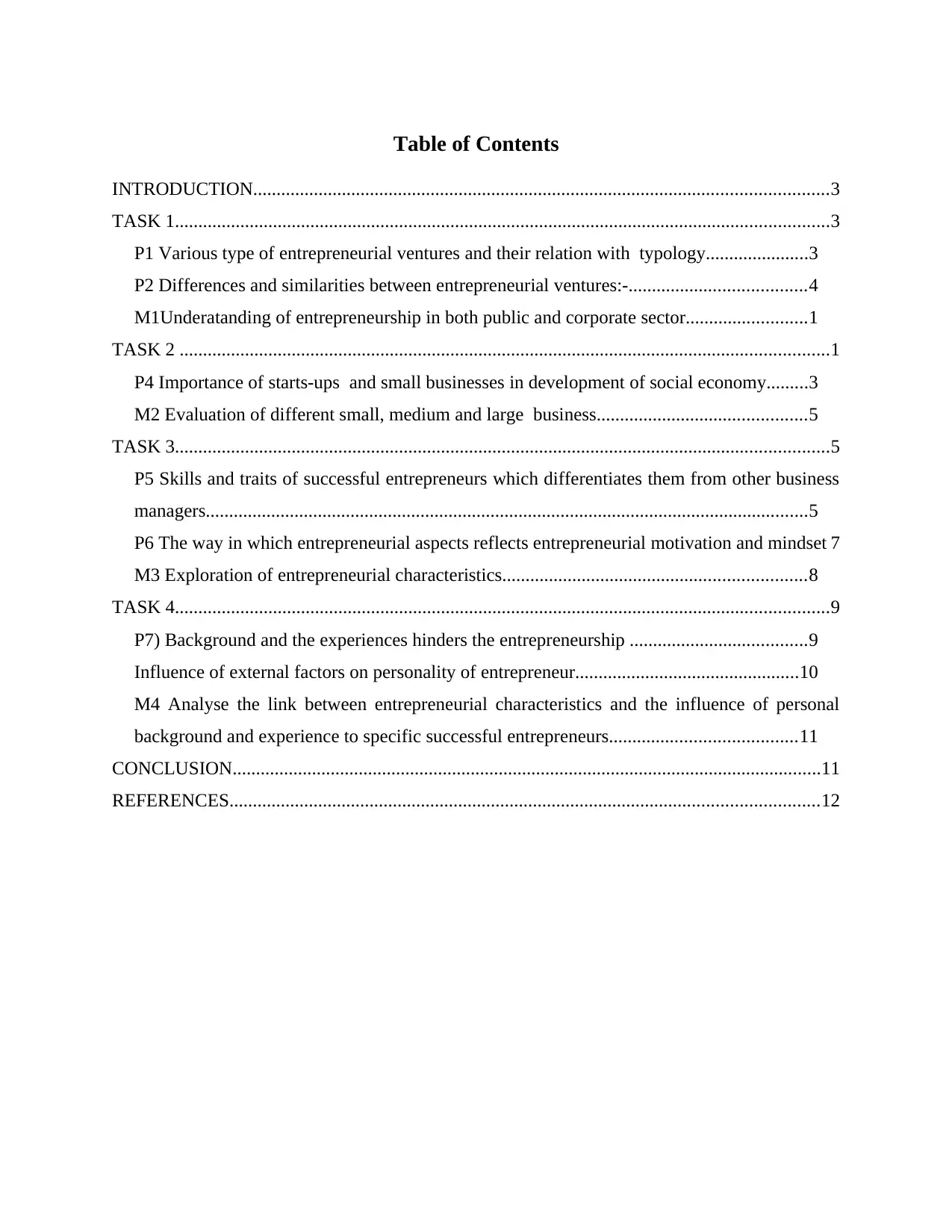
Table of Contents
INTRODUCTION...........................................................................................................................3
TASK 1............................................................................................................................................3
P1 Various type of entrepreneurial ventures and their relation with typology......................3
P2 Differences and similarities between entrepreneurial ventures:-......................................4
M1Underatanding of entrepreneurship in both public and corporate sector..........................1
TASK 2 ...........................................................................................................................................1
P4 Importance of starts-ups and small businesses in development of social economy.........3
M2 Evaluation of different small, medium and large business.............................................5
TASK 3............................................................................................................................................5
P5 Skills and traits of successful entrepreneurs which differentiates them from other business
managers.................................................................................................................................5
P6 The way in which entrepreneurial aspects reflects entrepreneurial motivation and mindset 7
M3 Exploration of entrepreneurial characteristics.................................................................8
TASK 4............................................................................................................................................9
P7) Background and the experiences hinders the entrepreneurship ......................................9
Influence of external factors on personality of entrepreneur................................................10
M4 Analyse the link between entrepreneurial characteristics and the influence of personal
background and experience to specific successful entrepreneurs........................................11
CONCLUSION..............................................................................................................................11
REFERENCES..............................................................................................................................12
INTRODUCTION...........................................................................................................................3
TASK 1............................................................................................................................................3
P1 Various type of entrepreneurial ventures and their relation with typology......................3
P2 Differences and similarities between entrepreneurial ventures:-......................................4
M1Underatanding of entrepreneurship in both public and corporate sector..........................1
TASK 2 ...........................................................................................................................................1
P4 Importance of starts-ups and small businesses in development of social economy.........3
M2 Evaluation of different small, medium and large business.............................................5
TASK 3............................................................................................................................................5
P5 Skills and traits of successful entrepreneurs which differentiates them from other business
managers.................................................................................................................................5
P6 The way in which entrepreneurial aspects reflects entrepreneurial motivation and mindset 7
M3 Exploration of entrepreneurial characteristics.................................................................8
TASK 4............................................................................................................................................9
P7) Background and the experiences hinders the entrepreneurship ......................................9
Influence of external factors on personality of entrepreneur................................................10
M4 Analyse the link between entrepreneurial characteristics and the influence of personal
background and experience to specific successful entrepreneurs........................................11
CONCLUSION..............................................................................................................................11
REFERENCES..............................................................................................................................12
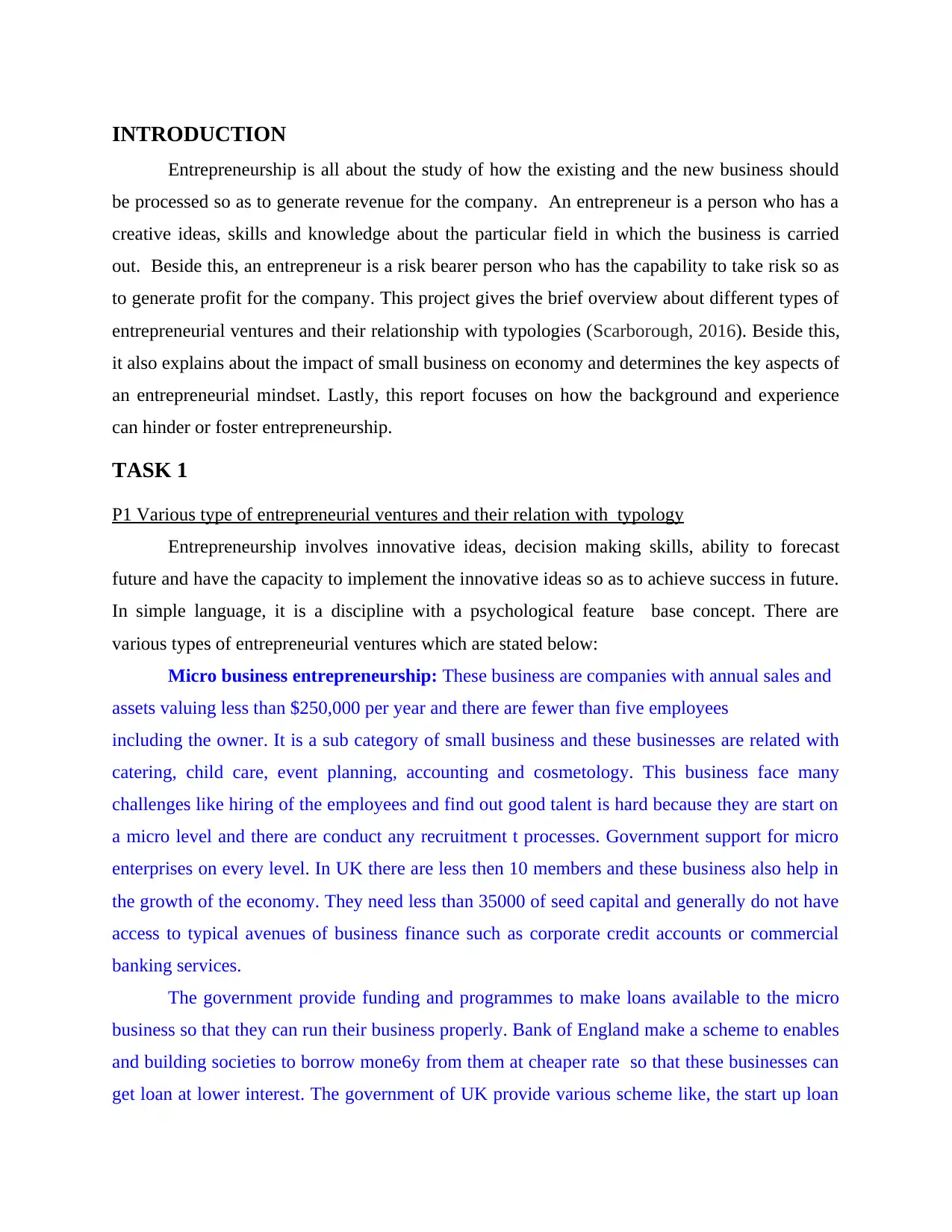
INTRODUCTION
Entrepreneurship is all about the study of how the existing and the new business should
be processed so as to generate revenue for the company. An entrepreneur is a person who has a
creative ideas, skills and knowledge about the particular field in which the business is carried
out. Beside this, an entrepreneur is a risk bearer person who has the capability to take risk so as
to generate profit for the company. This project gives the brief overview about different types of
entrepreneurial ventures and their relationship with typologies (Scarborough, 2016). Beside this,
it also explains about the impact of small business on economy and determines the key aspects of
an entrepreneurial mindset. Lastly, this report focuses on how the background and experience
can hinder or foster entrepreneurship.
TASK 1
P1 Various type of entrepreneurial ventures and their relation with typology
Entrepreneurship involves innovative ideas, decision making skills, ability to forecast
future and have the capacity to implement the innovative ideas so as to achieve success in future.
In simple language, it is a discipline with a psychological feature base concept. There are
various types of entrepreneurial ventures which are stated below:
Micro business entrepreneurship: These business are companies with annual sales and
assets valuing less than $250,000 per year and there are fewer than five employees
including the owner. It is a sub category of small business and these businesses are related with
catering, child care, event planning, accounting and cosmetology. This business face many
challenges like hiring of the employees and find out good talent is hard because they are start on
a micro level and there are conduct any recruitment t processes. Government support for micro
enterprises on every level. In UK there are less then 10 members and these business also help in
the growth of the economy. They need less than 35000 of seed capital and generally do not have
access to typical avenues of business finance such as corporate credit accounts or commercial
banking services.
The government provide funding and programmes to make loans available to the micro
business so that they can run their business properly. Bank of England make a scheme to enables
and building societies to borrow mone6y from them at cheaper rate so that these businesses can
get loan at lower interest. The government of UK provide various scheme like, the start up loan
Entrepreneurship is all about the study of how the existing and the new business should
be processed so as to generate revenue for the company. An entrepreneur is a person who has a
creative ideas, skills and knowledge about the particular field in which the business is carried
out. Beside this, an entrepreneur is a risk bearer person who has the capability to take risk so as
to generate profit for the company. This project gives the brief overview about different types of
entrepreneurial ventures and their relationship with typologies (Scarborough, 2016). Beside this,
it also explains about the impact of small business on economy and determines the key aspects of
an entrepreneurial mindset. Lastly, this report focuses on how the background and experience
can hinder or foster entrepreneurship.
TASK 1
P1 Various type of entrepreneurial ventures and their relation with typology
Entrepreneurship involves innovative ideas, decision making skills, ability to forecast
future and have the capacity to implement the innovative ideas so as to achieve success in future.
In simple language, it is a discipline with a psychological feature base concept. There are
various types of entrepreneurial ventures which are stated below:
Micro business entrepreneurship: These business are companies with annual sales and
assets valuing less than $250,000 per year and there are fewer than five employees
including the owner. It is a sub category of small business and these businesses are related with
catering, child care, event planning, accounting and cosmetology. This business face many
challenges like hiring of the employees and find out good talent is hard because they are start on
a micro level and there are conduct any recruitment t processes. Government support for micro
enterprises on every level. In UK there are less then 10 members and these business also help in
the growth of the economy. They need less than 35000 of seed capital and generally do not have
access to typical avenues of business finance such as corporate credit accounts or commercial
banking services.
The government provide funding and programmes to make loans available to the micro
business so that they can run their business properly. Bank of England make a scheme to enables
and building societies to borrow mone6y from them at cheaper rate so that these businesses can
get loan at lower interest. The government of UK provide various scheme like, the start up loan
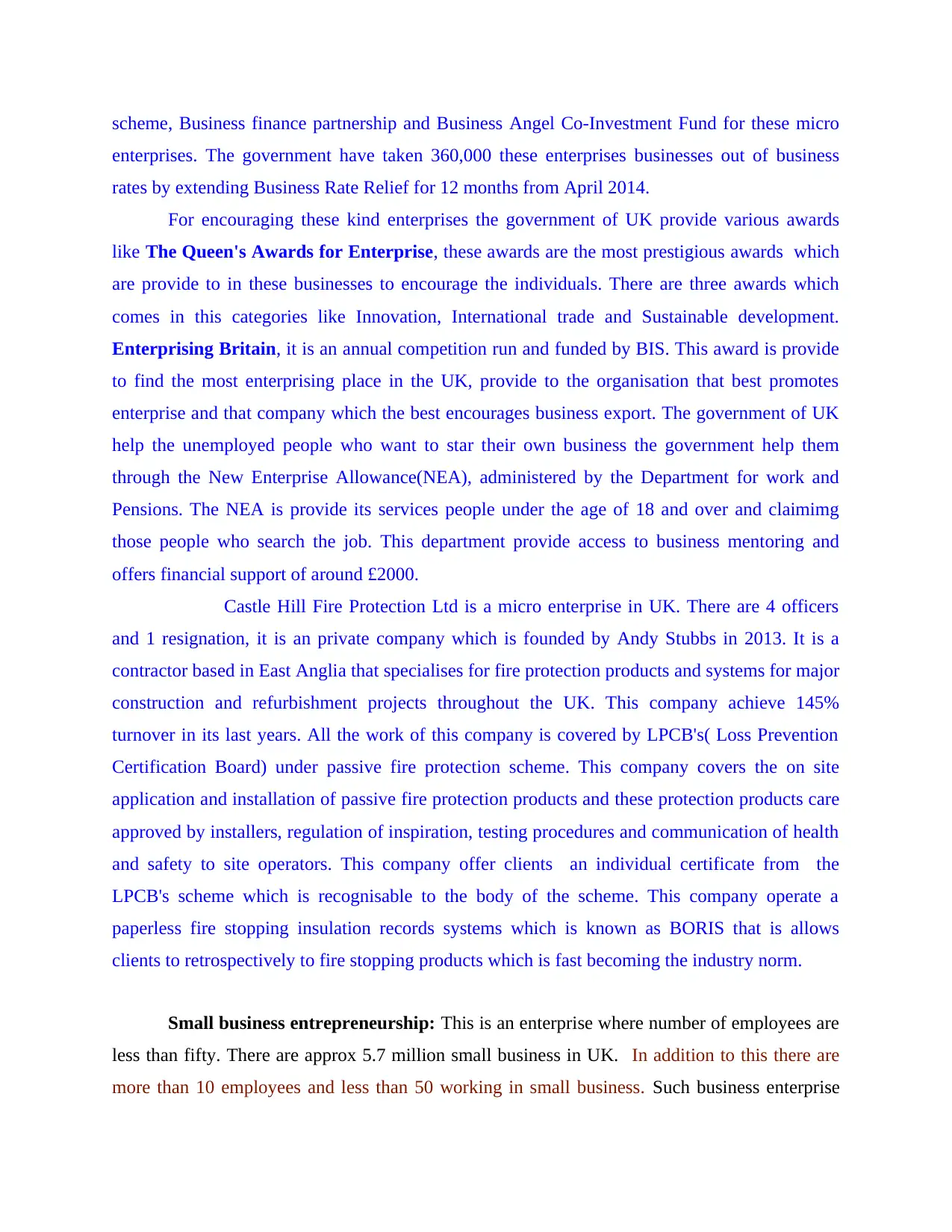
scheme, Business finance partnership and Business Angel Co-Investment Fund for these micro
enterprises. The government have taken 360,000 these enterprises businesses out of business
rates by extending Business Rate Relief for 12 months from April 2014.
For encouraging these kind enterprises the government of UK provide various awards
like The Queen's Awards for Enterprise, these awards are the most prestigious awards which
are provide to in these businesses to encourage the individuals. There are three awards which
comes in this categories like Innovation, International trade and Sustainable development.
Enterprising Britain, it is an annual competition run and funded by BIS. This award is provide
to find the most enterprising place in the UK, provide to the organisation that best promotes
enterprise and that company which the best encourages business export. The government of UK
help the unemployed people who want to star their own business the government help them
through the New Enterprise Allowance(NEA), administered by the Department for work and
Pensions. The NEA is provide its services people under the age of 18 and over and claimimg
those people who search the job. This department provide access to business mentoring and
offers financial support of around £2000.
Castle Hill Fire Protection Ltd is a micro enterprise in UK. There are 4 officers
and 1 resignation, it is an private company which is founded by Andy Stubbs in 2013. It is a
contractor based in East Anglia that specialises for fire protection products and systems for major
construction and refurbishment projects throughout the UK. This company achieve 145%
turnover in its last years. All the work of this company is covered by LPCB's( Loss Prevention
Certification Board) under passive fire protection scheme. This company covers the on site
application and installation of passive fire protection products and these protection products care
approved by installers, regulation of inspiration, testing procedures and communication of health
and safety to site operators. This company offer clients an individual certificate from the
LPCB's scheme which is recognisable to the body of the scheme. This company operate a
paperless fire stopping insulation records systems which is known as BORIS that is allows
clients to retrospectively to fire stopping products which is fast becoming the industry norm.
Small business entrepreneurship: This is an enterprise where number of employees are
less than fifty. There are approx 5.7 million small business in UK. In addition to this there are
more than 10 employees and less than 50 working in small business. Such business enterprise
enterprises. The government have taken 360,000 these enterprises businesses out of business
rates by extending Business Rate Relief for 12 months from April 2014.
For encouraging these kind enterprises the government of UK provide various awards
like The Queen's Awards for Enterprise, these awards are the most prestigious awards which
are provide to in these businesses to encourage the individuals. There are three awards which
comes in this categories like Innovation, International trade and Sustainable development.
Enterprising Britain, it is an annual competition run and funded by BIS. This award is provide
to find the most enterprising place in the UK, provide to the organisation that best promotes
enterprise and that company which the best encourages business export. The government of UK
help the unemployed people who want to star their own business the government help them
through the New Enterprise Allowance(NEA), administered by the Department for work and
Pensions. The NEA is provide its services people under the age of 18 and over and claimimg
those people who search the job. This department provide access to business mentoring and
offers financial support of around £2000.
Castle Hill Fire Protection Ltd is a micro enterprise in UK. There are 4 officers
and 1 resignation, it is an private company which is founded by Andy Stubbs in 2013. It is a
contractor based in East Anglia that specialises for fire protection products and systems for major
construction and refurbishment projects throughout the UK. This company achieve 145%
turnover in its last years. All the work of this company is covered by LPCB's( Loss Prevention
Certification Board) under passive fire protection scheme. This company covers the on site
application and installation of passive fire protection products and these protection products care
approved by installers, regulation of inspiration, testing procedures and communication of health
and safety to site operators. This company offer clients an individual certificate from the
LPCB's scheme which is recognisable to the body of the scheme. This company operate a
paperless fire stopping insulation records systems which is known as BORIS that is allows
clients to retrospectively to fire stopping products which is fast becoming the industry norm.
Small business entrepreneurship: This is an enterprise where number of employees are
less than fifty. There are approx 5.7 million small business in UK. In addition to this there are
more than 10 employees and less than 50 working in small business. Such business enterprise
Secure Best Marks with AI Grader
Need help grading? Try our AI Grader for instant feedback on your assignments.
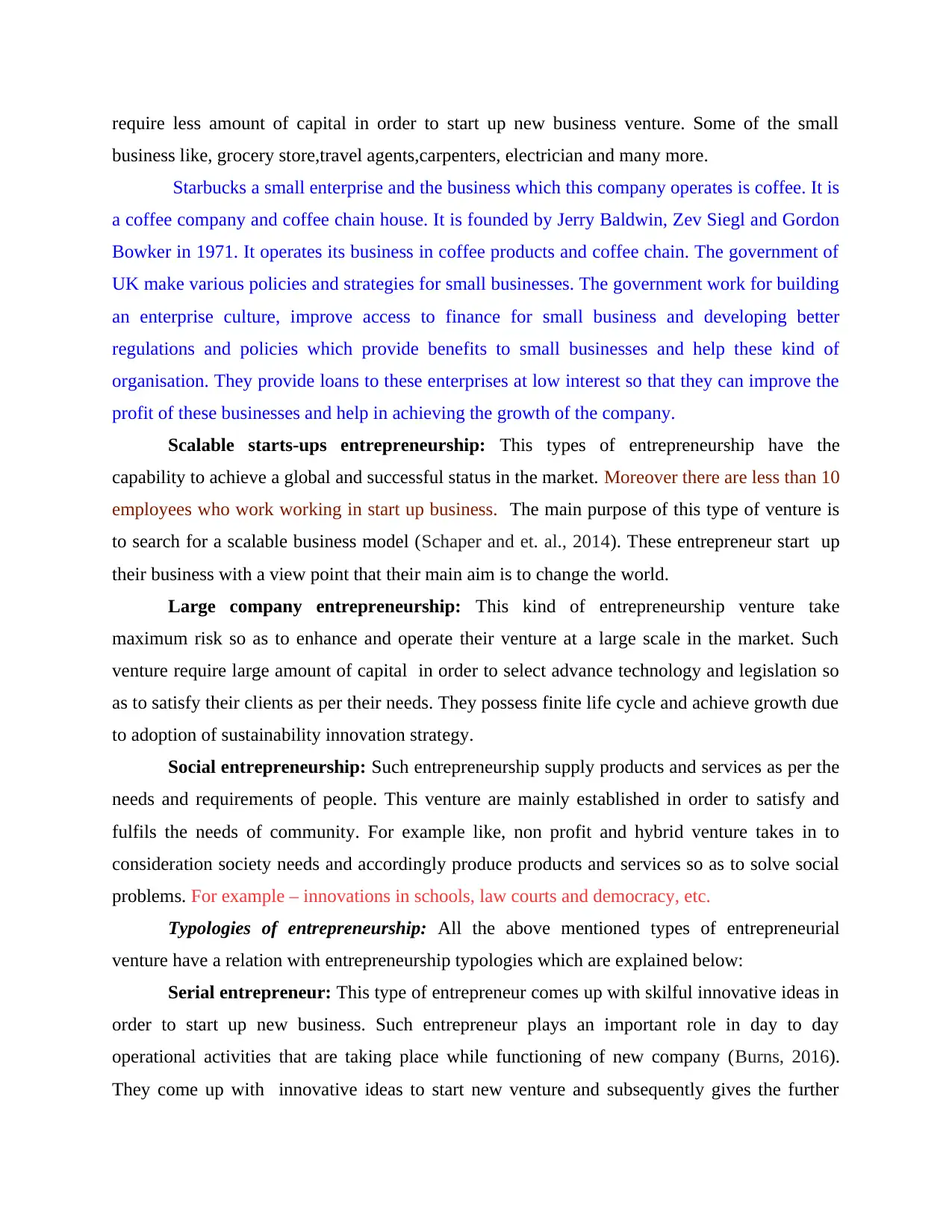
require less amount of capital in order to start up new business venture. Some of the small
business like, grocery store,travel agents,carpenters, electrician and many more.
Starbucks a small enterprise and the business which this company operates is coffee. It is
a coffee company and coffee chain house. It is founded by Jerry Baldwin, Zev Siegl and Gordon
Bowker in 1971. It operates its business in coffee products and coffee chain. The government of
UK make various policies and strategies for small businesses. The government work for building
an enterprise culture, improve access to finance for small business and developing better
regulations and policies which provide benefits to small businesses and help these kind of
organisation. They provide loans to these enterprises at low interest so that they can improve the
profit of these businesses and help in achieving the growth of the company.
Scalable starts-ups entrepreneurship: This types of entrepreneurship have the
capability to achieve a global and successful status in the market. Moreover there are less than 10
employees who work working in start up business. The main purpose of this type of venture is
to search for a scalable business model (Schaper and et. al., 2014). These entrepreneur start up
their business with a view point that their main aim is to change the world.
Large company entrepreneurship: This kind of entrepreneurship venture take
maximum risk so as to enhance and operate their venture at a large scale in the market. Such
venture require large amount of capital in order to select advance technology and legislation so
as to satisfy their clients as per their needs. They possess finite life cycle and achieve growth due
to adoption of sustainability innovation strategy.
Social entrepreneurship: Such entrepreneurship supply products and services as per the
needs and requirements of people. This venture are mainly established in order to satisfy and
fulfils the needs of community. For example like, non profit and hybrid venture takes in to
consideration society needs and accordingly produce products and services so as to solve social
problems. For example – innovations in schools, law courts and democracy, etc.
Typologies of entrepreneurship: All the above mentioned types of entrepreneurial
venture have a relation with entrepreneurship typologies which are explained below:
Serial entrepreneur: This type of entrepreneur comes up with skilful innovative ideas in
order to start up new business. Such entrepreneur plays an important role in day to day
operational activities that are taking place while functioning of new company (Burns, 2016).
They come up with innovative ideas to start new venture and subsequently gives the further
business like, grocery store,travel agents,carpenters, electrician and many more.
Starbucks a small enterprise and the business which this company operates is coffee. It is
a coffee company and coffee chain house. It is founded by Jerry Baldwin, Zev Siegl and Gordon
Bowker in 1971. It operates its business in coffee products and coffee chain. The government of
UK make various policies and strategies for small businesses. The government work for building
an enterprise culture, improve access to finance for small business and developing better
regulations and policies which provide benefits to small businesses and help these kind of
organisation. They provide loans to these enterprises at low interest so that they can improve the
profit of these businesses and help in achieving the growth of the company.
Scalable starts-ups entrepreneurship: This types of entrepreneurship have the
capability to achieve a global and successful status in the market. Moreover there are less than 10
employees who work working in start up business. The main purpose of this type of venture is
to search for a scalable business model (Schaper and et. al., 2014). These entrepreneur start up
their business with a view point that their main aim is to change the world.
Large company entrepreneurship: This kind of entrepreneurship venture take
maximum risk so as to enhance and operate their venture at a large scale in the market. Such
venture require large amount of capital in order to select advance technology and legislation so
as to satisfy their clients as per their needs. They possess finite life cycle and achieve growth due
to adoption of sustainability innovation strategy.
Social entrepreneurship: Such entrepreneurship supply products and services as per the
needs and requirements of people. This venture are mainly established in order to satisfy and
fulfils the needs of community. For example like, non profit and hybrid venture takes in to
consideration society needs and accordingly produce products and services so as to solve social
problems. For example – innovations in schools, law courts and democracy, etc.
Typologies of entrepreneurship: All the above mentioned types of entrepreneurial
venture have a relation with entrepreneurship typologies which are explained below:
Serial entrepreneur: This type of entrepreneur comes up with skilful innovative ideas in
order to start up new business. Such entrepreneur plays an important role in day to day
operational activities that are taking place while functioning of new company (Burns, 2016).
They come up with innovative ideas to start new venture and subsequently gives the further
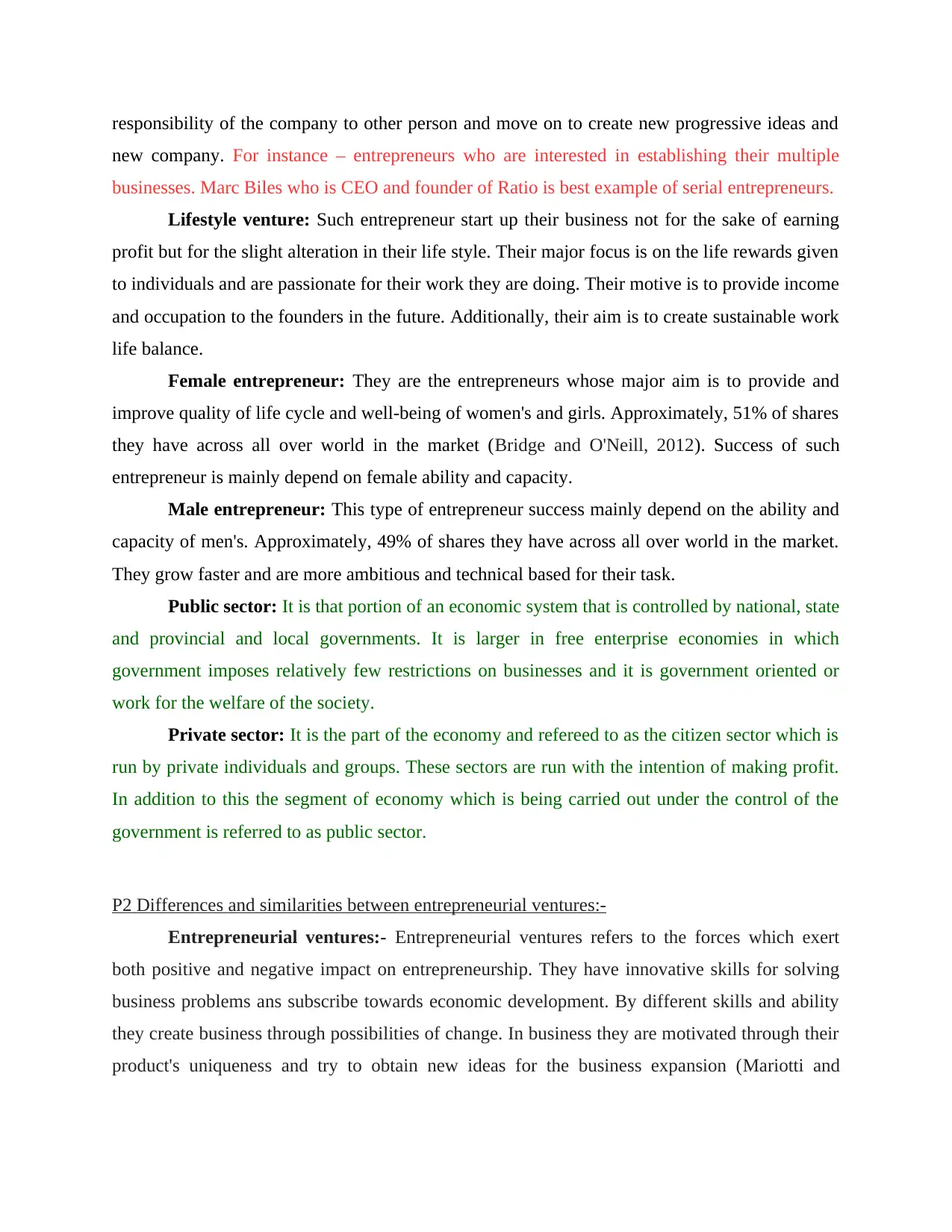
responsibility of the company to other person and move on to create new progressive ideas and
new company. For instance – entrepreneurs who are interested in establishing their multiple
businesses. Marc Biles who is CEO and founder of Ratio is best example of serial entrepreneurs.
Lifestyle venture: Such entrepreneur start up their business not for the sake of earning
profit but for the slight alteration in their life style. Their major focus is on the life rewards given
to individuals and are passionate for their work they are doing. Their motive is to provide income
and occupation to the founders in the future. Additionally, their aim is to create sustainable work
life balance.
Female entrepreneur: They are the entrepreneurs whose major aim is to provide and
improve quality of life cycle and well-being of women's and girls. Approximately, 51% of shares
they have across all over world in the market (Bridge and O'Neill, 2012). Success of such
entrepreneur is mainly depend on female ability and capacity.
Male entrepreneur: This type of entrepreneur success mainly depend on the ability and
capacity of men's. Approximately, 49% of shares they have across all over world in the market.
They grow faster and are more ambitious and technical based for their task.
Public sector: It is that portion of an economic system that is controlled by national, state
and provincial and local governments. It is larger in free enterprise economies in which
government imposes relatively few restrictions on businesses and it is government oriented or
work for the welfare of the society.
Private sector: It is the part of the economy and refereed to as the citizen sector which is
run by private individuals and groups. These sectors are run with the intention of making profit.
In addition to this the segment of economy which is being carried out under the control of the
government is referred to as public sector.
P2 Differences and similarities between entrepreneurial ventures:-
Entrepreneurial ventures:- Entrepreneurial ventures refers to the forces which exert
both positive and negative impact on entrepreneurship. They have innovative skills for solving
business problems ans subscribe towards economic development. By different skills and ability
they create business through possibilities of change. In business they are motivated through their
product's uniqueness and try to obtain new ideas for the business expansion (Mariotti and
new company. For instance – entrepreneurs who are interested in establishing their multiple
businesses. Marc Biles who is CEO and founder of Ratio is best example of serial entrepreneurs.
Lifestyle venture: Such entrepreneur start up their business not for the sake of earning
profit but for the slight alteration in their life style. Their major focus is on the life rewards given
to individuals and are passionate for their work they are doing. Their motive is to provide income
and occupation to the founders in the future. Additionally, their aim is to create sustainable work
life balance.
Female entrepreneur: They are the entrepreneurs whose major aim is to provide and
improve quality of life cycle and well-being of women's and girls. Approximately, 51% of shares
they have across all over world in the market (Bridge and O'Neill, 2012). Success of such
entrepreneur is mainly depend on female ability and capacity.
Male entrepreneur: This type of entrepreneur success mainly depend on the ability and
capacity of men's. Approximately, 49% of shares they have across all over world in the market.
They grow faster and are more ambitious and technical based for their task.
Public sector: It is that portion of an economic system that is controlled by national, state
and provincial and local governments. It is larger in free enterprise economies in which
government imposes relatively few restrictions on businesses and it is government oriented or
work for the welfare of the society.
Private sector: It is the part of the economy and refereed to as the citizen sector which is
run by private individuals and groups. These sectors are run with the intention of making profit.
In addition to this the segment of economy which is being carried out under the control of the
government is referred to as public sector.
P2 Differences and similarities between entrepreneurial ventures:-
Entrepreneurial ventures:- Entrepreneurial ventures refers to the forces which exert
both positive and negative impact on entrepreneurship. They have innovative skills for solving
business problems ans subscribe towards economic development. By different skills and ability
they create business through possibilities of change. In business they are motivated through their
product's uniqueness and try to obtain new ideas for the business expansion (Mariotti and
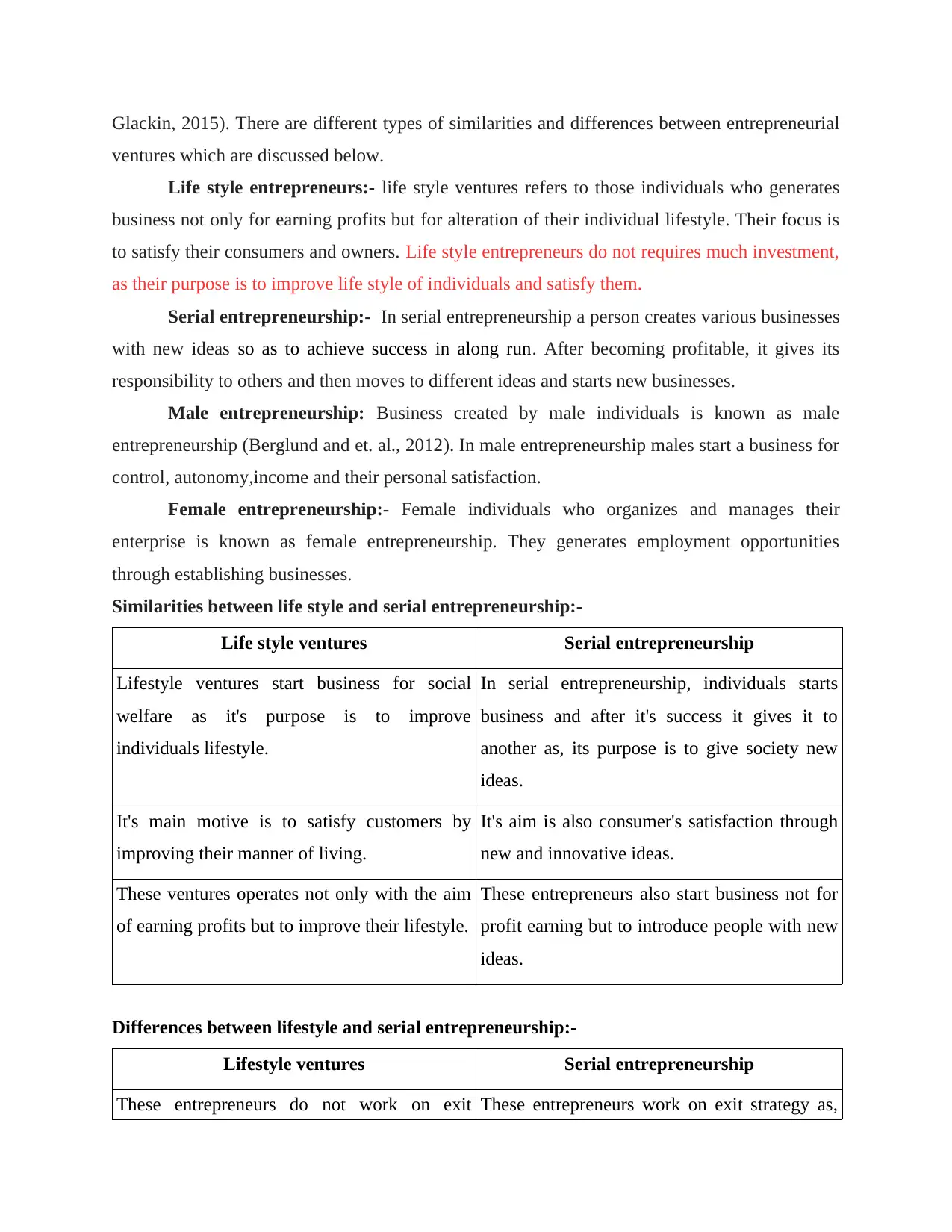
Glackin, 2015). There are different types of similarities and differences between entrepreneurial
ventures which are discussed below.
Life style entrepreneurs:- life style ventures refers to those individuals who generates
business not only for earning profits but for alteration of their individual lifestyle. Their focus is
to satisfy their consumers and owners. Life style entrepreneurs do not requires much investment,
as their purpose is to improve life style of individuals and satisfy them.
Serial entrepreneurship:- In serial entrepreneurship a person creates various businesses
with new ideas so as to achieve success in along run. After becoming profitable, it gives its
responsibility to others and then moves to different ideas and starts new businesses.
Male entrepreneurship: Business created by male individuals is known as male
entrepreneurship (Berglund and et. al., 2012). In male entrepreneurship males start a business for
control, autonomy,income and their personal satisfaction.
Female entrepreneurship:- Female individuals who organizes and manages their
enterprise is known as female entrepreneurship. They generates employment opportunities
through establishing businesses.
Similarities between life style and serial entrepreneurship:-
Life style ventures Serial entrepreneurship
Lifestyle ventures start business for social
welfare as it's purpose is to improve
individuals lifestyle.
In serial entrepreneurship, individuals starts
business and after it's success it gives it to
another as, its purpose is to give society new
ideas.
It's main motive is to satisfy customers by
improving their manner of living.
It's aim is also consumer's satisfaction through
new and innovative ideas.
These ventures operates not only with the aim
of earning profits but to improve their lifestyle.
These entrepreneurs also start business not for
profit earning but to introduce people with new
ideas.
Differences between lifestyle and serial entrepreneurship:-
Lifestyle ventures Serial entrepreneurship
These entrepreneurs do not work on exit These entrepreneurs work on exit strategy as,
ventures which are discussed below.
Life style entrepreneurs:- life style ventures refers to those individuals who generates
business not only for earning profits but for alteration of their individual lifestyle. Their focus is
to satisfy their consumers and owners. Life style entrepreneurs do not requires much investment,
as their purpose is to improve life style of individuals and satisfy them.
Serial entrepreneurship:- In serial entrepreneurship a person creates various businesses
with new ideas so as to achieve success in along run. After becoming profitable, it gives its
responsibility to others and then moves to different ideas and starts new businesses.
Male entrepreneurship: Business created by male individuals is known as male
entrepreneurship (Berglund and et. al., 2012). In male entrepreneurship males start a business for
control, autonomy,income and their personal satisfaction.
Female entrepreneurship:- Female individuals who organizes and manages their
enterprise is known as female entrepreneurship. They generates employment opportunities
through establishing businesses.
Similarities between life style and serial entrepreneurship:-
Life style ventures Serial entrepreneurship
Lifestyle ventures start business for social
welfare as it's purpose is to improve
individuals lifestyle.
In serial entrepreneurship, individuals starts
business and after it's success it gives it to
another as, its purpose is to give society new
ideas.
It's main motive is to satisfy customers by
improving their manner of living.
It's aim is also consumer's satisfaction through
new and innovative ideas.
These ventures operates not only with the aim
of earning profits but to improve their lifestyle.
These entrepreneurs also start business not for
profit earning but to introduce people with new
ideas.
Differences between lifestyle and serial entrepreneurship:-
Lifestyle ventures Serial entrepreneurship
These entrepreneurs do not work on exit These entrepreneurs work on exit strategy as,
Paraphrase This Document
Need a fresh take? Get an instant paraphrase of this document with our AI Paraphraser

strategy, as their purpose is to make lifestyle
effective.
they work until the success of a business to
give it's responsibility to another and move into
new one.
effective.
they work until the success of a business to
give it's responsibility to another and move into
new one.
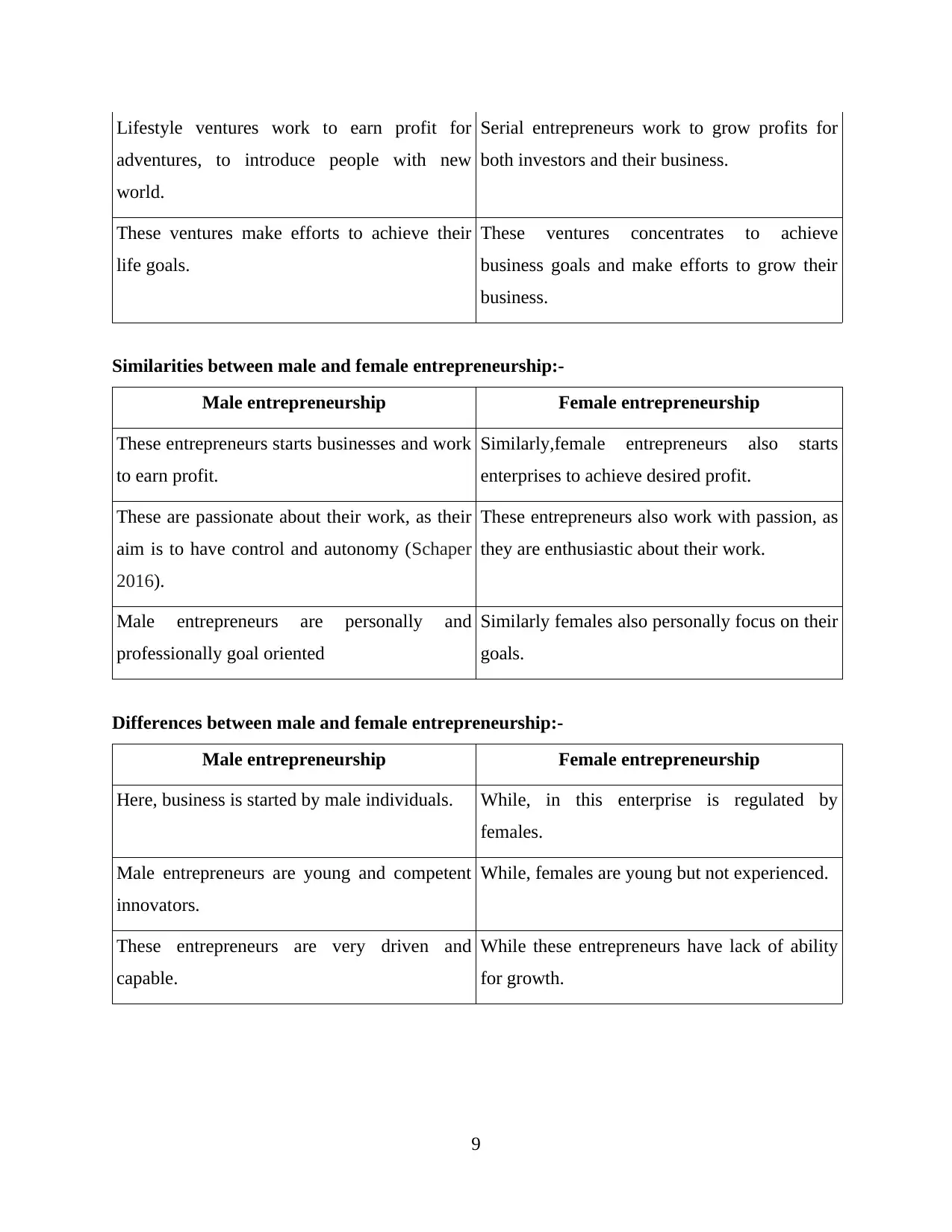
Lifestyle ventures work to earn profit for
adventures, to introduce people with new
world.
Serial entrepreneurs work to grow profits for
both investors and their business.
These ventures make efforts to achieve their
life goals.
These ventures concentrates to achieve
business goals and make efforts to grow their
business.
Similarities between male and female entrepreneurship:-
Male entrepreneurship Female entrepreneurship
These entrepreneurs starts businesses and work
to earn profit.
Similarly,female entrepreneurs also starts
enterprises to achieve desired profit.
These are passionate about their work, as their
aim is to have control and autonomy (Schaper
2016).
These entrepreneurs also work with passion, as
they are enthusiastic about their work.
Male entrepreneurs are personally and
professionally goal oriented
Similarly females also personally focus on their
goals.
Differences between male and female entrepreneurship:-
Male entrepreneurship Female entrepreneurship
Here, business is started by male individuals. While, in this enterprise is regulated by
females.
Male entrepreneurs are young and competent
innovators.
While, females are young but not experienced.
These entrepreneurs are very driven and
capable.
While these entrepreneurs have lack of ability
for growth.
9
adventures, to introduce people with new
world.
Serial entrepreneurs work to grow profits for
both investors and their business.
These ventures make efforts to achieve their
life goals.
These ventures concentrates to achieve
business goals and make efforts to grow their
business.
Similarities between male and female entrepreneurship:-
Male entrepreneurship Female entrepreneurship
These entrepreneurs starts businesses and work
to earn profit.
Similarly,female entrepreneurs also starts
enterprises to achieve desired profit.
These are passionate about their work, as their
aim is to have control and autonomy (Schaper
2016).
These entrepreneurs also work with passion, as
they are enthusiastic about their work.
Male entrepreneurs are personally and
professionally goal oriented
Similarly females also personally focus on their
goals.
Differences between male and female entrepreneurship:-
Male entrepreneurship Female entrepreneurship
Here, business is started by male individuals. While, in this enterprise is regulated by
females.
Male entrepreneurs are young and competent
innovators.
While, females are young but not experienced.
These entrepreneurs are very driven and
capable.
While these entrepreneurs have lack of ability
for growth.
9
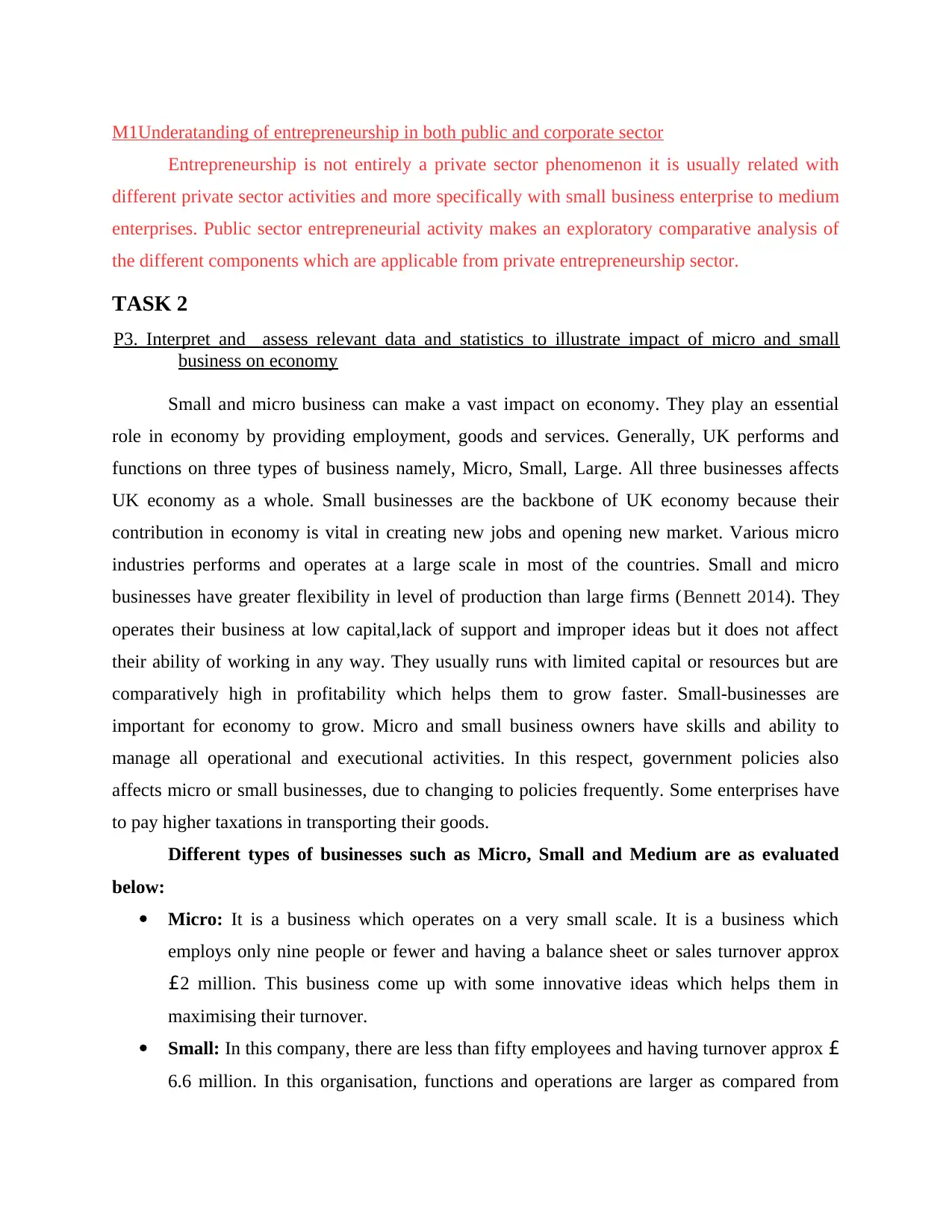
M1Underatanding of entrepreneurship in both public and corporate sector
Entrepreneurship is not entirely a private sector phenomenon it is usually related with
different private sector activities and more specifically with small business enterprise to medium
enterprises. Public sector entrepreneurial activity makes an exploratory comparative analysis of
the different components which are applicable from private entrepreneurship sector.
TASK 2
P3. Interpret and assess relevant data and statistics to illustrate impact of micro and small
business on economy
Small and micro business can make a vast impact on economy. They play an essential
role in economy by providing employment, goods and services. Generally, UK performs and
functions on three types of business namely, Micro, Small, Large. All three businesses affects
UK economy as a whole. Small businesses are the backbone of UK economy because their
contribution in economy is vital in creating new jobs and opening new market. Various micro
industries performs and operates at a large scale in most of the countries. Small and micro
businesses have greater flexibility in level of production than large firms (Bennett 2014). They
operates their business at low capital,lack of support and improper ideas but it does not affect
their ability of working in any way. They usually runs with limited capital or resources but are
comparatively high in profitability which helps them to grow faster. Small-businesses are
important for economy to grow. Micro and small business owners have skills and ability to
manage all operational and executional activities. In this respect, government policies also
affects micro or small businesses, due to changing to policies frequently. Some enterprises have
to pay higher taxations in transporting their goods.
Different types of businesses such as Micro, Small and Medium are as evaluated
below:
Micro: It is a business which operates on a very small scale. It is a business which
employs only nine people or fewer and having a balance sheet or sales turnover approx
£2 million. This business come up with some innovative ideas which helps them in
maximising their turnover.
Small: In this company, there are less than fifty employees and having turnover approx £
6.6 million. In this organisation, functions and operations are larger as compared from
Entrepreneurship is not entirely a private sector phenomenon it is usually related with
different private sector activities and more specifically with small business enterprise to medium
enterprises. Public sector entrepreneurial activity makes an exploratory comparative analysis of
the different components which are applicable from private entrepreneurship sector.
TASK 2
P3. Interpret and assess relevant data and statistics to illustrate impact of micro and small
business on economy
Small and micro business can make a vast impact on economy. They play an essential
role in economy by providing employment, goods and services. Generally, UK performs and
functions on three types of business namely, Micro, Small, Large. All three businesses affects
UK economy as a whole. Small businesses are the backbone of UK economy because their
contribution in economy is vital in creating new jobs and opening new market. Various micro
industries performs and operates at a large scale in most of the countries. Small and micro
businesses have greater flexibility in level of production than large firms (Bennett 2014). They
operates their business at low capital,lack of support and improper ideas but it does not affect
their ability of working in any way. They usually runs with limited capital or resources but are
comparatively high in profitability which helps them to grow faster. Small-businesses are
important for economy to grow. Micro and small business owners have skills and ability to
manage all operational and executional activities. In this respect, government policies also
affects micro or small businesses, due to changing to policies frequently. Some enterprises have
to pay higher taxations in transporting their goods.
Different types of businesses such as Micro, Small and Medium are as evaluated
below:
Micro: It is a business which operates on a very small scale. It is a business which
employs only nine people or fewer and having a balance sheet or sales turnover approx
£2 million. This business come up with some innovative ideas which helps them in
maximising their turnover.
Small: In this company, there are less than fifty employees and having turnover approx £
6.6 million. In this organisation, functions and operations are larger as compared from
Secure Best Marks with AI Grader
Need help grading? Try our AI Grader for instant feedback on your assignments.
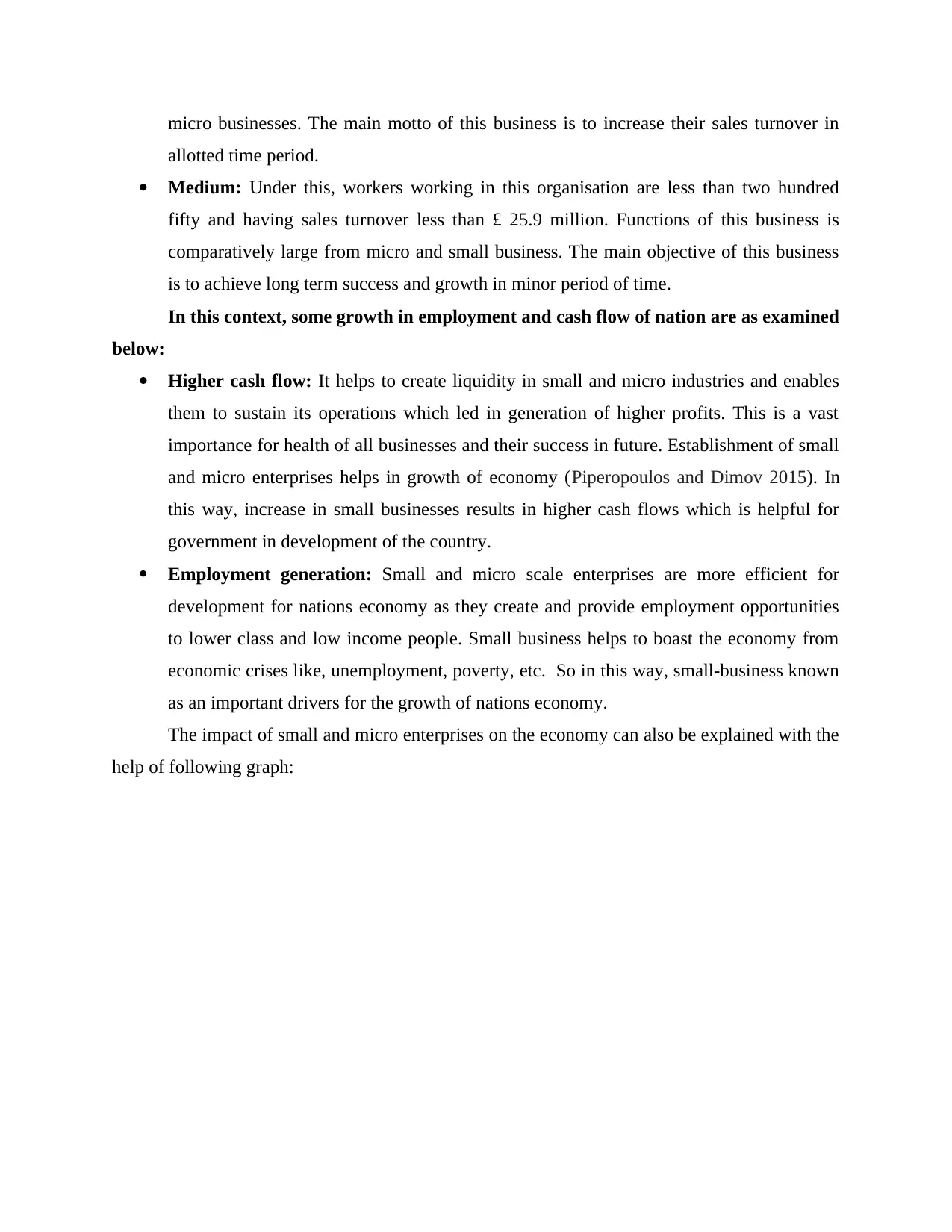
micro businesses. The main motto of this business is to increase their sales turnover in
allotted time period.
Medium: Under this, workers working in this organisation are less than two hundred
fifty and having sales turnover less than £ 25.9 million. Functions of this business is
comparatively large from micro and small business. The main objective of this business
is to achieve long term success and growth in minor period of time.
In this context, some growth in employment and cash flow of nation are as examined
below:
Higher cash flow: It helps to create liquidity in small and micro industries and enables
them to sustain its operations which led in generation of higher profits. This is a vast
importance for health of all businesses and their success in future. Establishment of small
and micro enterprises helps in growth of economy (Piperopoulos and Dimov 2015). In
this way, increase in small businesses results in higher cash flows which is helpful for
government in development of the country.
Employment generation: Small and micro scale enterprises are more efficient for
development for nations economy as they create and provide employment opportunities
to lower class and low income people. Small business helps to boast the economy from
economic crises like, unemployment, poverty, etc. So in this way, small-business known
as an important drivers for the growth of nations economy.
The impact of small and micro enterprises on the economy can also be explained with the
help of following graph:
allotted time period.
Medium: Under this, workers working in this organisation are less than two hundred
fifty and having sales turnover less than £ 25.9 million. Functions of this business is
comparatively large from micro and small business. The main objective of this business
is to achieve long term success and growth in minor period of time.
In this context, some growth in employment and cash flow of nation are as examined
below:
Higher cash flow: It helps to create liquidity in small and micro industries and enables
them to sustain its operations which led in generation of higher profits. This is a vast
importance for health of all businesses and their success in future. Establishment of small
and micro enterprises helps in growth of economy (Piperopoulos and Dimov 2015). In
this way, increase in small businesses results in higher cash flows which is helpful for
government in development of the country.
Employment generation: Small and micro scale enterprises are more efficient for
development for nations economy as they create and provide employment opportunities
to lower class and low income people. Small business helps to boast the economy from
economic crises like, unemployment, poverty, etc. So in this way, small-business known
as an important drivers for the growth of nations economy.
The impact of small and micro enterprises on the economy can also be explained with the
help of following graph:
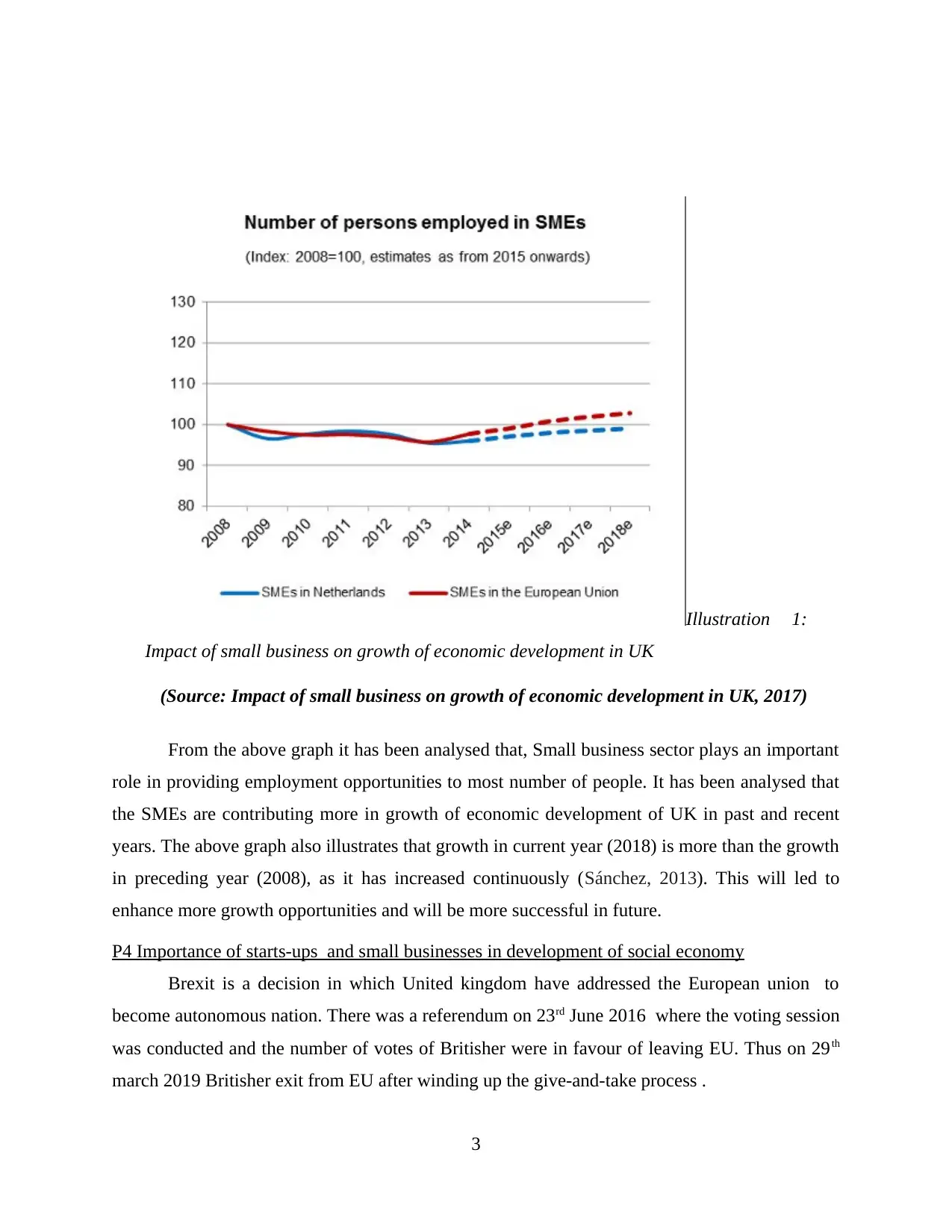
(Source: Impact of small business on growth of economic development in UK, 2017)
From the above graph it has been analysed that, Small business sector plays an important
role in providing employment opportunities to most number of people. It has been analysed that
the SMEs are contributing more in growth of economic development of UK in past and recent
years. The above graph also illustrates that growth in current year (2018) is more than the growth
in preceding year (2008), as it has increased continuously (Sánchez, 2013). This will led to
enhance more growth opportunities and will be more successful in future.
P4 Importance of starts-ups and small businesses in development of social economy
Brexit is a decision in which United kingdom have addressed the European union to
become autonomous nation. There was a referendum on 23rd June 2016 where the voting session
was conducted and the number of votes of Britisher were in favour of leaving EU. Thus on 29th
march 2019 Britisher exit from EU after winding up the give-and-take process .
3
Illustration 1:
Impact of small business on growth of economic development in UK
From the above graph it has been analysed that, Small business sector plays an important
role in providing employment opportunities to most number of people. It has been analysed that
the SMEs are contributing more in growth of economic development of UK in past and recent
years. The above graph also illustrates that growth in current year (2018) is more than the growth
in preceding year (2008), as it has increased continuously (Sánchez, 2013). This will led to
enhance more growth opportunities and will be more successful in future.
P4 Importance of starts-ups and small businesses in development of social economy
Brexit is a decision in which United kingdom have addressed the European union to
become autonomous nation. There was a referendum on 23rd June 2016 where the voting session
was conducted and the number of votes of Britisher were in favour of leaving EU. Thus on 29th
march 2019 Britisher exit from EU after winding up the give-and-take process .
3
Illustration 1:
Impact of small business on growth of economic development in UK
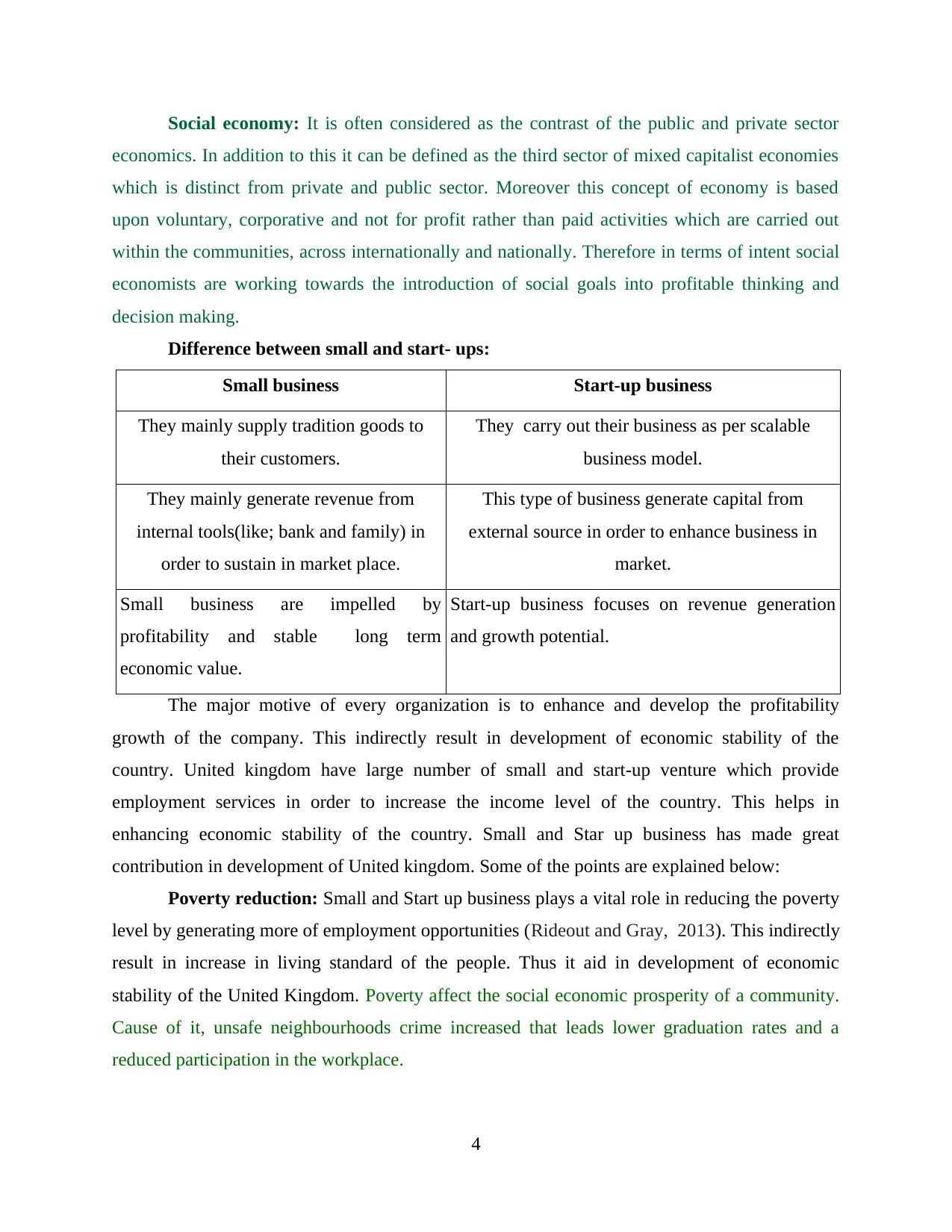
Social economy: It is often considered as the contrast of the public and private sector
economics. In addition to this it can be defined as the third sector of mixed capitalist economies
which is distinct from private and public sector. Moreover this concept of economy is based
upon voluntary, corporative and not for profit rather than paid activities which are carried out
within the communities, across internationally and nationally. Therefore in terms of intent social
economists are working towards the introduction of social goals into profitable thinking and
decision making.
Difference between small and start- ups:
Small business Start-up business
They mainly supply tradition goods to
their customers.
They carry out their business as per scalable
business model.
They mainly generate revenue from
internal tools(like; bank and family) in
order to sustain in market place.
This type of business generate capital from
external source in order to enhance business in
market.
Small business are impelled by
profitability and stable long term
economic value.
Start-up business focuses on revenue generation
and growth potential.
The major motive of every organization is to enhance and develop the profitability
growth of the company. This indirectly result in development of economic stability of the
country. United kingdom have large number of small and start-up venture which provide
employment services in order to increase the income level of the country. This helps in
enhancing economic stability of the country. Small and Star up business has made great
contribution in development of United kingdom. Some of the points are explained below:
Poverty reduction: Small and Start up business plays a vital role in reducing the poverty
level by generating more of employment opportunities (Rideout and Gray, 2013). This indirectly
result in increase in living standard of the people. Thus it aid in development of economic
stability of the United Kingdom. Poverty affect the social economic prosperity of a community.
Cause of it, unsafe neighbourhoods crime increased that leads lower graduation rates and a
reduced participation in the workplace.
4
economics. In addition to this it can be defined as the third sector of mixed capitalist economies
which is distinct from private and public sector. Moreover this concept of economy is based
upon voluntary, corporative and not for profit rather than paid activities which are carried out
within the communities, across internationally and nationally. Therefore in terms of intent social
economists are working towards the introduction of social goals into profitable thinking and
decision making.
Difference between small and start- ups:
Small business Start-up business
They mainly supply tradition goods to
their customers.
They carry out their business as per scalable
business model.
They mainly generate revenue from
internal tools(like; bank and family) in
order to sustain in market place.
This type of business generate capital from
external source in order to enhance business in
market.
Small business are impelled by
profitability and stable long term
economic value.
Start-up business focuses on revenue generation
and growth potential.
The major motive of every organization is to enhance and develop the profitability
growth of the company. This indirectly result in development of economic stability of the
country. United kingdom have large number of small and start-up venture which provide
employment services in order to increase the income level of the country. This helps in
enhancing economic stability of the country. Small and Star up business has made great
contribution in development of United kingdom. Some of the points are explained below:
Poverty reduction: Small and Start up business plays a vital role in reducing the poverty
level by generating more of employment opportunities (Rideout and Gray, 2013). This indirectly
result in increase in living standard of the people. Thus it aid in development of economic
stability of the United Kingdom. Poverty affect the social economic prosperity of a community.
Cause of it, unsafe neighbourhoods crime increased that leads lower graduation rates and a
reduced participation in the workplace.
4
Paraphrase This Document
Need a fresh take? Get an instant paraphrase of this document with our AI Paraphraser
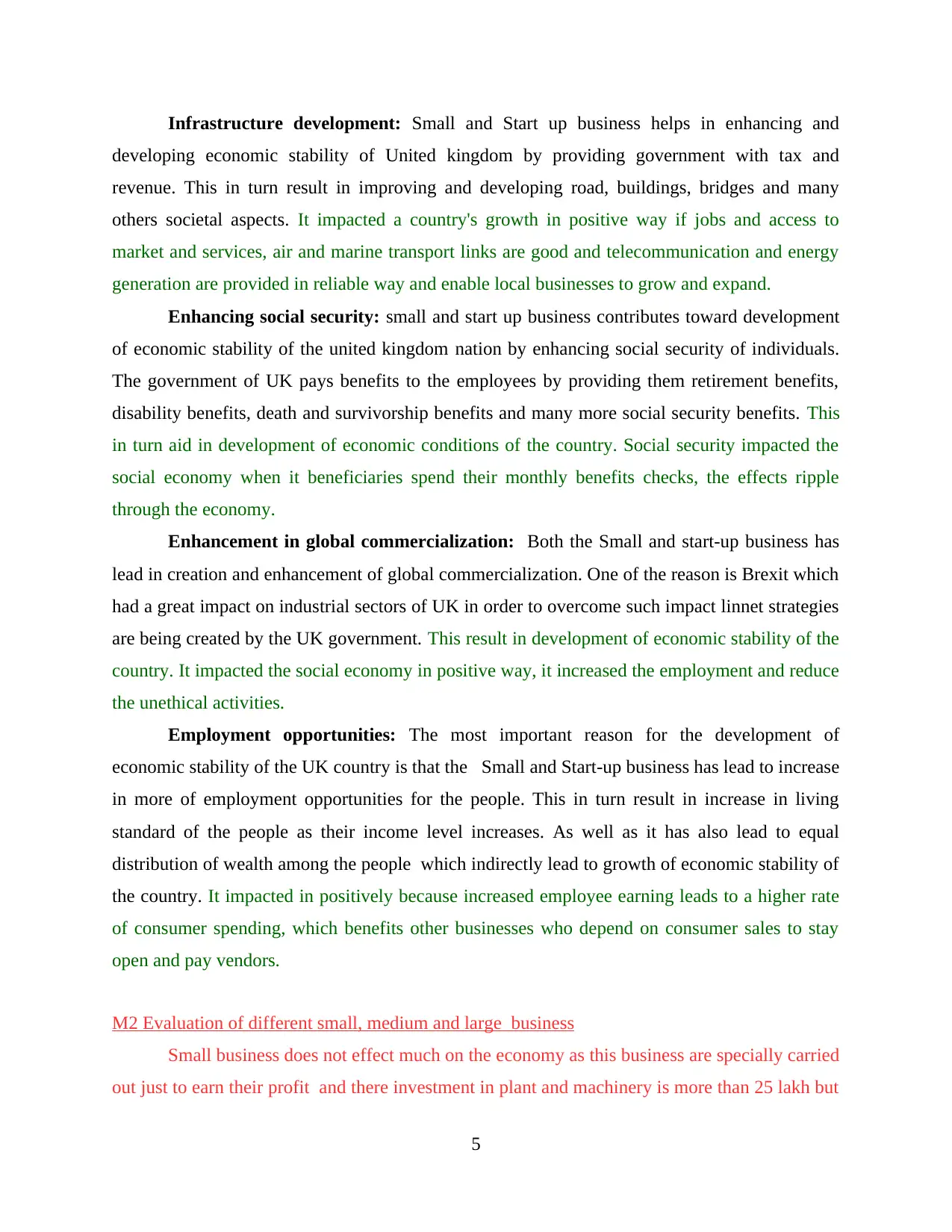
Infrastructure development: Small and Start up business helps in enhancing and
developing economic stability of United kingdom by providing government with tax and
revenue. This in turn result in improving and developing road, buildings, bridges and many
others societal aspects. It impacted a country's growth in positive way if jobs and access to
market and services, air and marine transport links are good and telecommunication and energy
generation are provided in reliable way and enable local businesses to grow and expand.
Enhancing social security: small and start up business contributes toward development
of economic stability of the united kingdom nation by enhancing social security of individuals.
The government of UK pays benefits to the employees by providing them retirement benefits,
disability benefits, death and survivorship benefits and many more social security benefits. This
in turn aid in development of economic conditions of the country. Social security impacted the
social economy when it beneficiaries spend their monthly benefits checks, the effects ripple
through the economy.
Enhancement in global commercialization: Both the Small and start-up business has
lead in creation and enhancement of global commercialization. One of the reason is Brexit which
had a great impact on industrial sectors of UK in order to overcome such impact linnet strategies
are being created by the UK government. This result in development of economic stability of the
country. It impacted the social economy in positive way, it increased the employment and reduce
the unethical activities.
Employment opportunities: The most important reason for the development of
economic stability of the UK country is that the Small and Start-up business has lead to increase
in more of employment opportunities for the people. This in turn result in increase in living
standard of the people as their income level increases. As well as it has also lead to equal
distribution of wealth among the people which indirectly lead to growth of economic stability of
the country. It impacted in positively because increased employee earning leads to a higher rate
of consumer spending, which benefits other businesses who depend on consumer sales to stay
open and pay vendors.
M2 Evaluation of different small, medium and large business
Small business does not effect much on the economy as this business are specially carried
out just to earn their profit and there investment in plant and machinery is more than 25 lakh but
5
developing economic stability of United kingdom by providing government with tax and
revenue. This in turn result in improving and developing road, buildings, bridges and many
others societal aspects. It impacted a country's growth in positive way if jobs and access to
market and services, air and marine transport links are good and telecommunication and energy
generation are provided in reliable way and enable local businesses to grow and expand.
Enhancing social security: small and start up business contributes toward development
of economic stability of the united kingdom nation by enhancing social security of individuals.
The government of UK pays benefits to the employees by providing them retirement benefits,
disability benefits, death and survivorship benefits and many more social security benefits. This
in turn aid in development of economic conditions of the country. Social security impacted the
social economy when it beneficiaries spend their monthly benefits checks, the effects ripple
through the economy.
Enhancement in global commercialization: Both the Small and start-up business has
lead in creation and enhancement of global commercialization. One of the reason is Brexit which
had a great impact on industrial sectors of UK in order to overcome such impact linnet strategies
are being created by the UK government. This result in development of economic stability of the
country. It impacted the social economy in positive way, it increased the employment and reduce
the unethical activities.
Employment opportunities: The most important reason for the development of
economic stability of the UK country is that the Small and Start-up business has lead to increase
in more of employment opportunities for the people. This in turn result in increase in living
standard of the people as their income level increases. As well as it has also lead to equal
distribution of wealth among the people which indirectly lead to growth of economic stability of
the country. It impacted in positively because increased employee earning leads to a higher rate
of consumer spending, which benefits other businesses who depend on consumer sales to stay
open and pay vendors.
M2 Evaluation of different small, medium and large business
Small business does not effect much on the economy as this business are specially carried
out just to earn their profit and there investment in plant and machinery is more than 25 lakh but
5
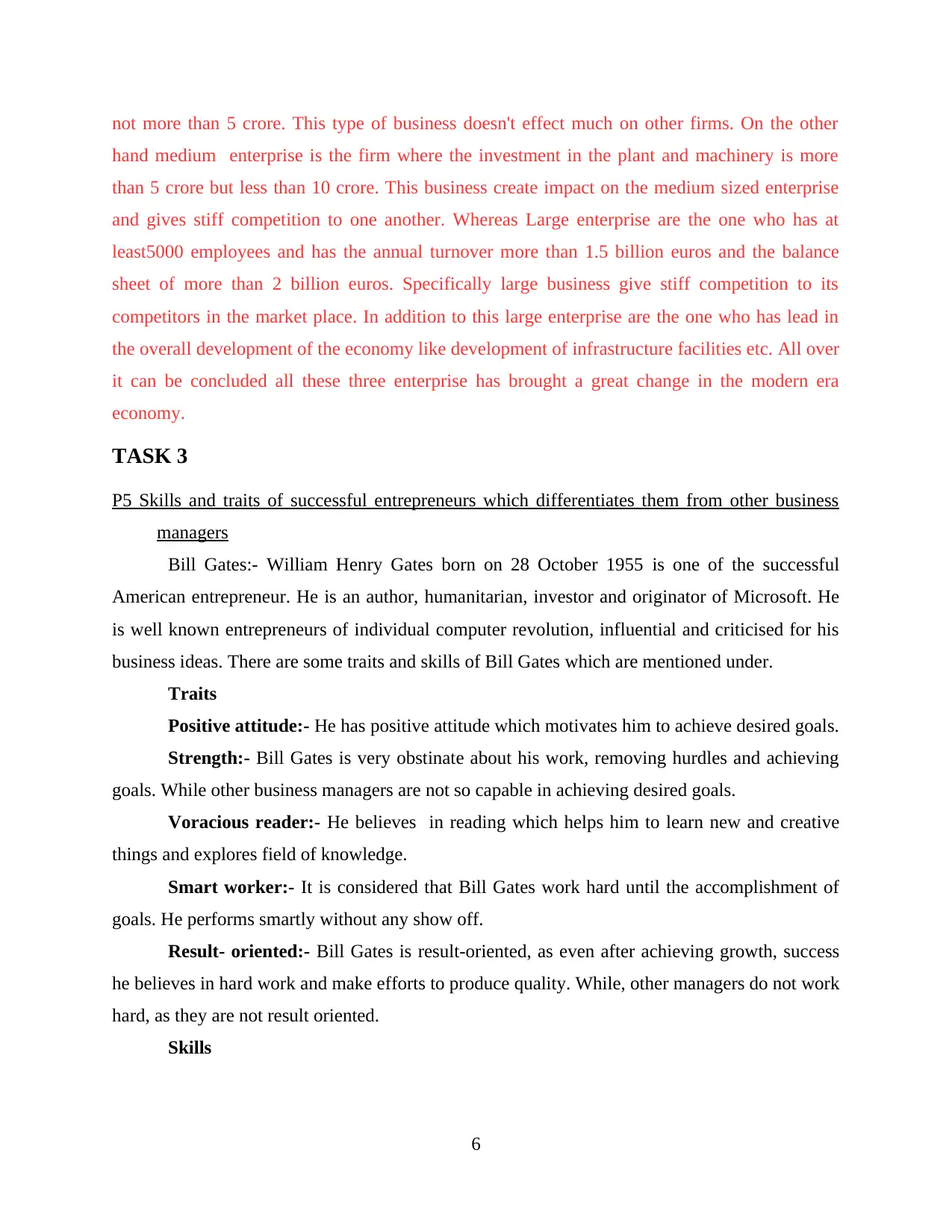
not more than 5 crore. This type of business doesn't effect much on other firms. On the other
hand medium enterprise is the firm where the investment in the plant and machinery is more
than 5 crore but less than 10 crore. This business create impact on the medium sized enterprise
and gives stiff competition to one another. Whereas Large enterprise are the one who has at
least5000 employees and has the annual turnover more than 1.5 billion euros and the balance
sheet of more than 2 billion euros. Specifically large business give stiff competition to its
competitors in the market place. In addition to this large enterprise are the one who has lead in
the overall development of the economy like development of infrastructure facilities etc. All over
it can be concluded all these three enterprise has brought a great change in the modern era
economy.
TASK 3
P5 Skills and traits of successful entrepreneurs which differentiates them from other business
managers
Bill Gates:- William Henry Gates born on 28 October 1955 is one of the successful
American entrepreneur. He is an author, humanitarian, investor and originator of Microsoft. He
is well known entrepreneurs of individual computer revolution, influential and criticised for his
business ideas. There are some traits and skills of Bill Gates which are mentioned under.
Traits
Positive attitude:- He has positive attitude which motivates him to achieve desired goals.
Strength:- Bill Gates is very obstinate about his work, removing hurdles and achieving
goals. While other business managers are not so capable in achieving desired goals.
Voracious reader:- He believes in reading which helps him to learn new and creative
things and explores field of knowledge.
Smart worker:- It is considered that Bill Gates work hard until the accomplishment of
goals. He performs smartly without any show off.
Result- oriented:- Bill Gates is result-oriented, as even after achieving growth, success
he believes in hard work and make efforts to produce quality. While, other managers do not work
hard, as they are not result oriented.
Skills
6
hand medium enterprise is the firm where the investment in the plant and machinery is more
than 5 crore but less than 10 crore. This business create impact on the medium sized enterprise
and gives stiff competition to one another. Whereas Large enterprise are the one who has at
least5000 employees and has the annual turnover more than 1.5 billion euros and the balance
sheet of more than 2 billion euros. Specifically large business give stiff competition to its
competitors in the market place. In addition to this large enterprise are the one who has lead in
the overall development of the economy like development of infrastructure facilities etc. All over
it can be concluded all these three enterprise has brought a great change in the modern era
economy.
TASK 3
P5 Skills and traits of successful entrepreneurs which differentiates them from other business
managers
Bill Gates:- William Henry Gates born on 28 October 1955 is one of the successful
American entrepreneur. He is an author, humanitarian, investor and originator of Microsoft. He
is well known entrepreneurs of individual computer revolution, influential and criticised for his
business ideas. There are some traits and skills of Bill Gates which are mentioned under.
Traits
Positive attitude:- He has positive attitude which motivates him to achieve desired goals.
Strength:- Bill Gates is very obstinate about his work, removing hurdles and achieving
goals. While other business managers are not so capable in achieving desired goals.
Voracious reader:- He believes in reading which helps him to learn new and creative
things and explores field of knowledge.
Smart worker:- It is considered that Bill Gates work hard until the accomplishment of
goals. He performs smartly without any show off.
Result- oriented:- Bill Gates is result-oriented, as even after achieving growth, success
he believes in hard work and make efforts to produce quality. While, other managers do not work
hard, as they are not result oriented.
Skills
6
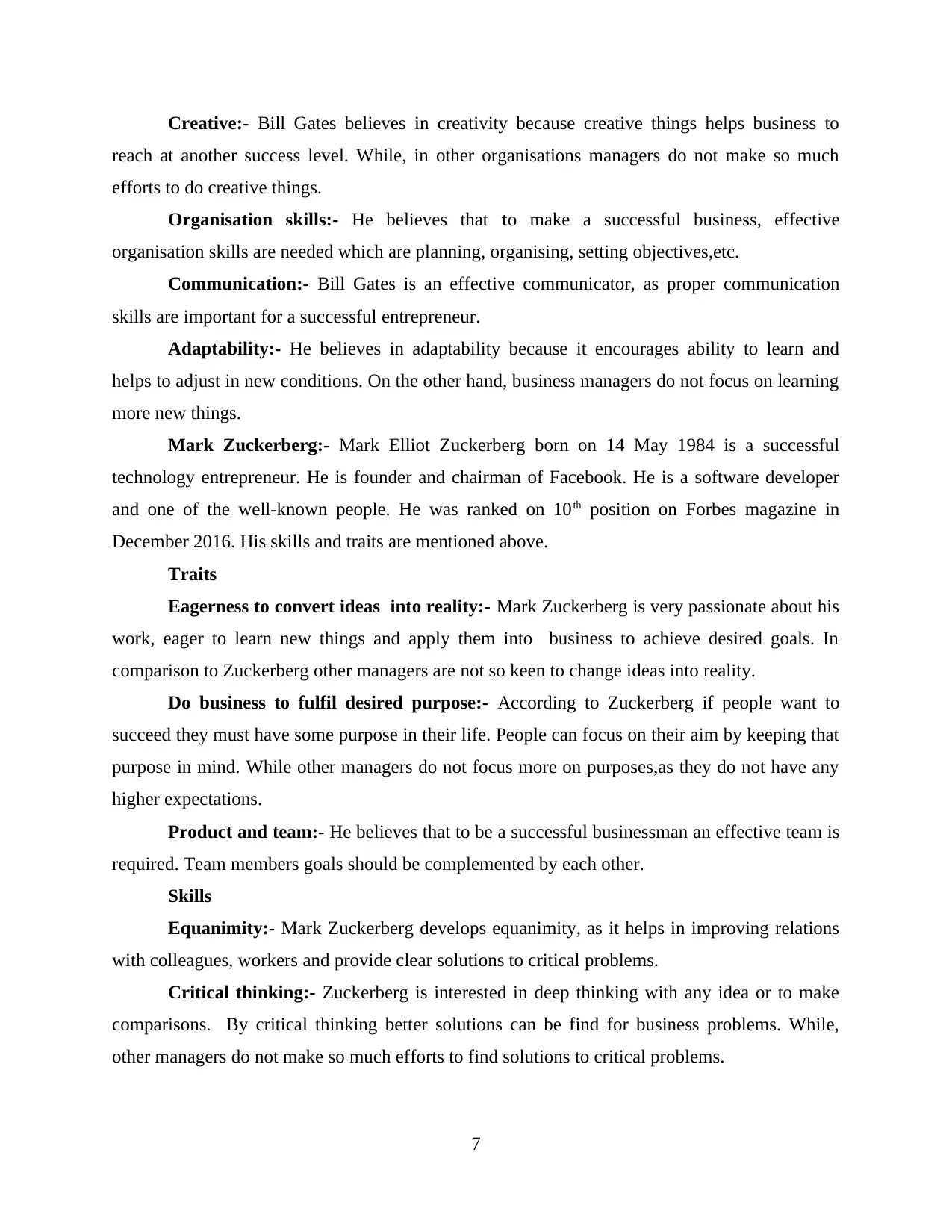
Creative:- Bill Gates believes in creativity because creative things helps business to
reach at another success level. While, in other organisations managers do not make so much
efforts to do creative things.
Organisation skills:- He believes that to make a successful business, effective
organisation skills are needed which are planning, organising, setting objectives,etc.
Communication:- Bill Gates is an effective communicator, as proper communication
skills are important for a successful entrepreneur.
Adaptability:- He believes in adaptability because it encourages ability to learn and
helps to adjust in new conditions. On the other hand, business managers do not focus on learning
more new things.
Mark Zuckerberg:- Mark Elliot Zuckerberg born on 14 May 1984 is a successful
technology entrepreneur. He is founder and chairman of Facebook. He is a software developer
and one of the well-known people. He was ranked on 10th position on Forbes magazine in
December 2016. His skills and traits are mentioned above.
Traits
Eagerness to convert ideas into reality:- Mark Zuckerberg is very passionate about his
work, eager to learn new things and apply them into business to achieve desired goals. In
comparison to Zuckerberg other managers are not so keen to change ideas into reality.
Do business to fulfil desired purpose:- According to Zuckerberg if people want to
succeed they must have some purpose in their life. People can focus on their aim by keeping that
purpose in mind. While other managers do not focus more on purposes,as they do not have any
higher expectations.
Product and team:- He believes that to be a successful businessman an effective team is
required. Team members goals should be complemented by each other.
Skills
Equanimity:- Mark Zuckerberg develops equanimity, as it helps in improving relations
with colleagues, workers and provide clear solutions to critical problems.
Critical thinking:- Zuckerberg is interested in deep thinking with any idea or to make
comparisons. By critical thinking better solutions can be find for business problems. While,
other managers do not make so much efforts to find solutions to critical problems.
7
reach at another success level. While, in other organisations managers do not make so much
efforts to do creative things.
Organisation skills:- He believes that to make a successful business, effective
organisation skills are needed which are planning, organising, setting objectives,etc.
Communication:- Bill Gates is an effective communicator, as proper communication
skills are important for a successful entrepreneur.
Adaptability:- He believes in adaptability because it encourages ability to learn and
helps to adjust in new conditions. On the other hand, business managers do not focus on learning
more new things.
Mark Zuckerberg:- Mark Elliot Zuckerberg born on 14 May 1984 is a successful
technology entrepreneur. He is founder and chairman of Facebook. He is a software developer
and one of the well-known people. He was ranked on 10th position on Forbes magazine in
December 2016. His skills and traits are mentioned above.
Traits
Eagerness to convert ideas into reality:- Mark Zuckerberg is very passionate about his
work, eager to learn new things and apply them into business to achieve desired goals. In
comparison to Zuckerberg other managers are not so keen to change ideas into reality.
Do business to fulfil desired purpose:- According to Zuckerberg if people want to
succeed they must have some purpose in their life. People can focus on their aim by keeping that
purpose in mind. While other managers do not focus more on purposes,as they do not have any
higher expectations.
Product and team:- He believes that to be a successful businessman an effective team is
required. Team members goals should be complemented by each other.
Skills
Equanimity:- Mark Zuckerberg develops equanimity, as it helps in improving relations
with colleagues, workers and provide clear solutions to critical problems.
Critical thinking:- Zuckerberg is interested in deep thinking with any idea or to make
comparisons. By critical thinking better solutions can be find for business problems. While,
other managers do not make so much efforts to find solutions to critical problems.
7
Secure Best Marks with AI Grader
Need help grading? Try our AI Grader for instant feedback on your assignments.
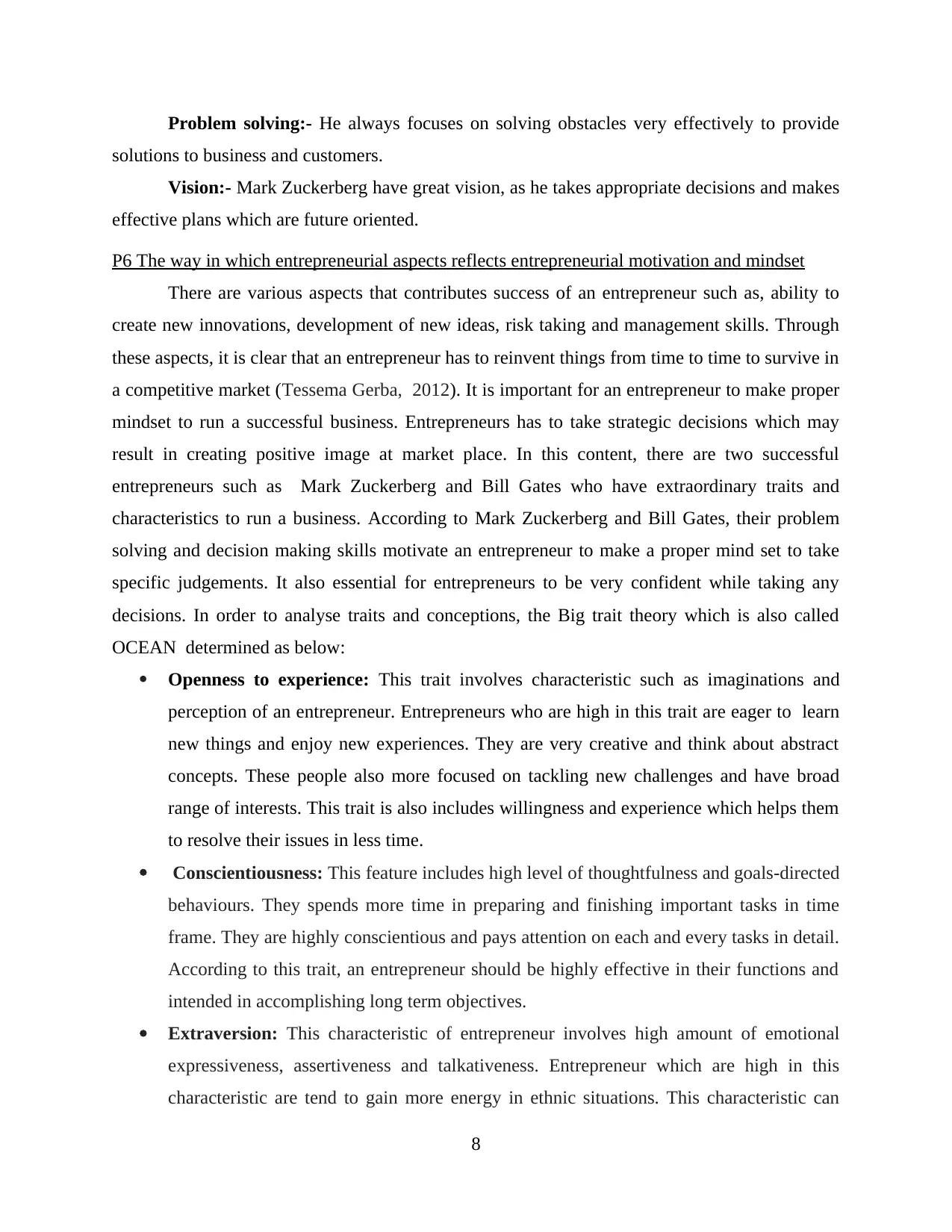
Problem solving:- He always focuses on solving obstacles very effectively to provide
solutions to business and customers.
Vision:- Mark Zuckerberg have great vision, as he takes appropriate decisions and makes
effective plans which are future oriented.
P6 The way in which entrepreneurial aspects reflects entrepreneurial motivation and mindset
There are various aspects that contributes success of an entrepreneur such as, ability to
create new innovations, development of new ideas, risk taking and management skills. Through
these aspects, it is clear that an entrepreneur has to reinvent things from time to time to survive in
a competitive market (Tessema Gerba, 2012). It is important for an entrepreneur to make proper
mindset to run a successful business. Entrepreneurs has to take strategic decisions which may
result in creating positive image at market place. In this content, there are two successful
entrepreneurs such as Mark Zuckerberg and Bill Gates who have extraordinary traits and
characteristics to run a business. According to Mark Zuckerberg and Bill Gates, their problem
solving and decision making skills motivate an entrepreneur to make a proper mind set to take
specific judgements. It also essential for entrepreneurs to be very confident while taking any
decisions. In order to analyse traits and conceptions, the Big trait theory which is also called
OCEAN determined as below:
Openness to experience: This trait involves characteristic such as imaginations and
perception of an entrepreneur. Entrepreneurs who are high in this trait are eager to learn
new things and enjoy new experiences. They are very creative and think about abstract
concepts. These people also more focused on tackling new challenges and have broad
range of interests. This trait is also includes willingness and experience which helps them
to resolve their issues in less time.
Conscientiousness: This feature includes high level of thoughtfulness and goals-directed
behaviours. They spends more time in preparing and finishing important tasks in time
frame. They are highly conscientious and pays attention on each and every tasks in detail.
According to this trait, an entrepreneur should be highly effective in their functions and
intended in accomplishing long term objectives.
Extraversion: This characteristic of entrepreneur involves high amount of emotional
expressiveness, assertiveness and talkativeness. Entrepreneur which are high in this
characteristic are tend to gain more energy in ethnic situations. This characteristic can
8
solutions to business and customers.
Vision:- Mark Zuckerberg have great vision, as he takes appropriate decisions and makes
effective plans which are future oriented.
P6 The way in which entrepreneurial aspects reflects entrepreneurial motivation and mindset
There are various aspects that contributes success of an entrepreneur such as, ability to
create new innovations, development of new ideas, risk taking and management skills. Through
these aspects, it is clear that an entrepreneur has to reinvent things from time to time to survive in
a competitive market (Tessema Gerba, 2012). It is important for an entrepreneur to make proper
mindset to run a successful business. Entrepreneurs has to take strategic decisions which may
result in creating positive image at market place. In this content, there are two successful
entrepreneurs such as Mark Zuckerberg and Bill Gates who have extraordinary traits and
characteristics to run a business. According to Mark Zuckerberg and Bill Gates, their problem
solving and decision making skills motivate an entrepreneur to make a proper mind set to take
specific judgements. It also essential for entrepreneurs to be very confident while taking any
decisions. In order to analyse traits and conceptions, the Big trait theory which is also called
OCEAN determined as below:
Openness to experience: This trait involves characteristic such as imaginations and
perception of an entrepreneur. Entrepreneurs who are high in this trait are eager to learn
new things and enjoy new experiences. They are very creative and think about abstract
concepts. These people also more focused on tackling new challenges and have broad
range of interests. This trait is also includes willingness and experience which helps them
to resolve their issues in less time.
Conscientiousness: This feature includes high level of thoughtfulness and goals-directed
behaviours. They spends more time in preparing and finishing important tasks in time
frame. They are highly conscientious and pays attention on each and every tasks in detail.
According to this trait, an entrepreneur should be highly effective in their functions and
intended in accomplishing long term objectives.
Extraversion: This characteristic of entrepreneur involves high amount of emotional
expressiveness, assertiveness and talkativeness. Entrepreneur which are high in this
characteristic are tend to gain more energy in ethnic situations. This characteristic can
8
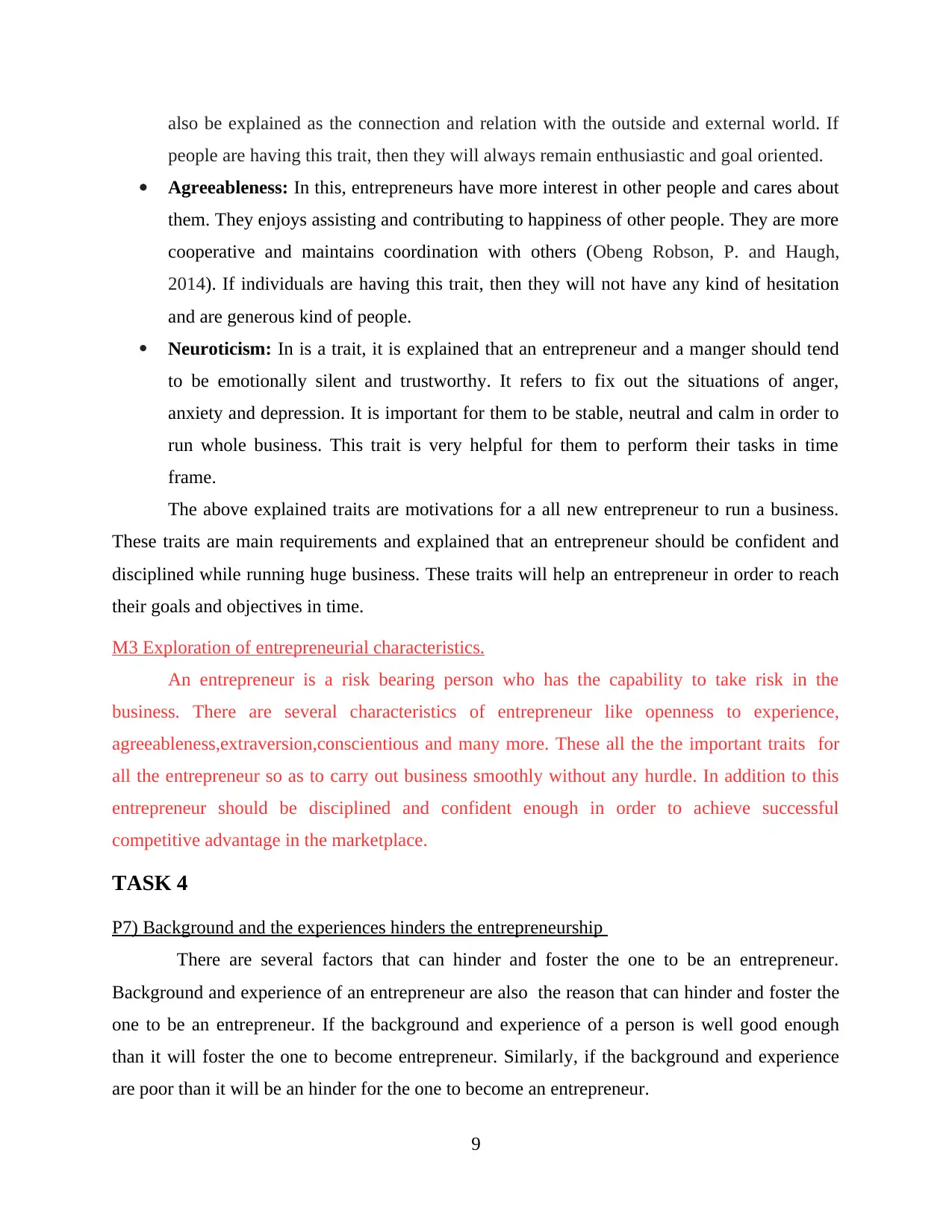
also be explained as the connection and relation with the outside and external world. If
people are having this trait, then they will always remain enthusiastic and goal oriented.
Agreeableness: In this, entrepreneurs have more interest in other people and cares about
them. They enjoys assisting and contributing to happiness of other people. They are more
cooperative and maintains coordination with others (Obeng Robson, P. and Haugh,
2014). If individuals are having this trait, then they will not have any kind of hesitation
and are generous kind of people.
Neuroticism: In is a trait, it is explained that an entrepreneur and a manger should tend
to be emotionally silent and trustworthy. It refers to fix out the situations of anger,
anxiety and depression. It is important for them to be stable, neutral and calm in order to
run whole business. This trait is very helpful for them to perform their tasks in time
frame.
The above explained traits are motivations for a all new entrepreneur to run a business.
These traits are main requirements and explained that an entrepreneur should be confident and
disciplined while running huge business. These traits will help an entrepreneur in order to reach
their goals and objectives in time.
M3 Exploration of entrepreneurial characteristics.
An entrepreneur is a risk bearing person who has the capability to take risk in the
business. There are several characteristics of entrepreneur like openness to experience,
agreeableness,extraversion,conscientious and many more. These all the the important traits for
all the entrepreneur so as to carry out business smoothly without any hurdle. In addition to this
entrepreneur should be disciplined and confident enough in order to achieve successful
competitive advantage in the marketplace.
TASK 4
P7) Background and the experiences hinders the entrepreneurship
There are several factors that can hinder and foster the one to be an entrepreneur.
Background and experience of an entrepreneur are also the reason that can hinder and foster the
one to be an entrepreneur. If the background and experience of a person is well good enough
than it will foster the one to become entrepreneur. Similarly, if the background and experience
are poor than it will be an hinder for the one to become an entrepreneur.
9
people are having this trait, then they will always remain enthusiastic and goal oriented.
Agreeableness: In this, entrepreneurs have more interest in other people and cares about
them. They enjoys assisting and contributing to happiness of other people. They are more
cooperative and maintains coordination with others (Obeng Robson, P. and Haugh,
2014). If individuals are having this trait, then they will not have any kind of hesitation
and are generous kind of people.
Neuroticism: In is a trait, it is explained that an entrepreneur and a manger should tend
to be emotionally silent and trustworthy. It refers to fix out the situations of anger,
anxiety and depression. It is important for them to be stable, neutral and calm in order to
run whole business. This trait is very helpful for them to perform their tasks in time
frame.
The above explained traits are motivations for a all new entrepreneur to run a business.
These traits are main requirements and explained that an entrepreneur should be confident and
disciplined while running huge business. These traits will help an entrepreneur in order to reach
their goals and objectives in time.
M3 Exploration of entrepreneurial characteristics.
An entrepreneur is a risk bearing person who has the capability to take risk in the
business. There are several characteristics of entrepreneur like openness to experience,
agreeableness,extraversion,conscientious and many more. These all the the important traits for
all the entrepreneur so as to carry out business smoothly without any hurdle. In addition to this
entrepreneur should be disciplined and confident enough in order to achieve successful
competitive advantage in the marketplace.
TASK 4
P7) Background and the experiences hinders the entrepreneurship
There are several factors that can hinder and foster the one to be an entrepreneur.
Background and experience of an entrepreneur are also the reason that can hinder and foster the
one to be an entrepreneur. If the background and experience of a person is well good enough
than it will foster the one to become entrepreneur. Similarly, if the background and experience
are poor than it will be an hinder for the one to become an entrepreneur.
9
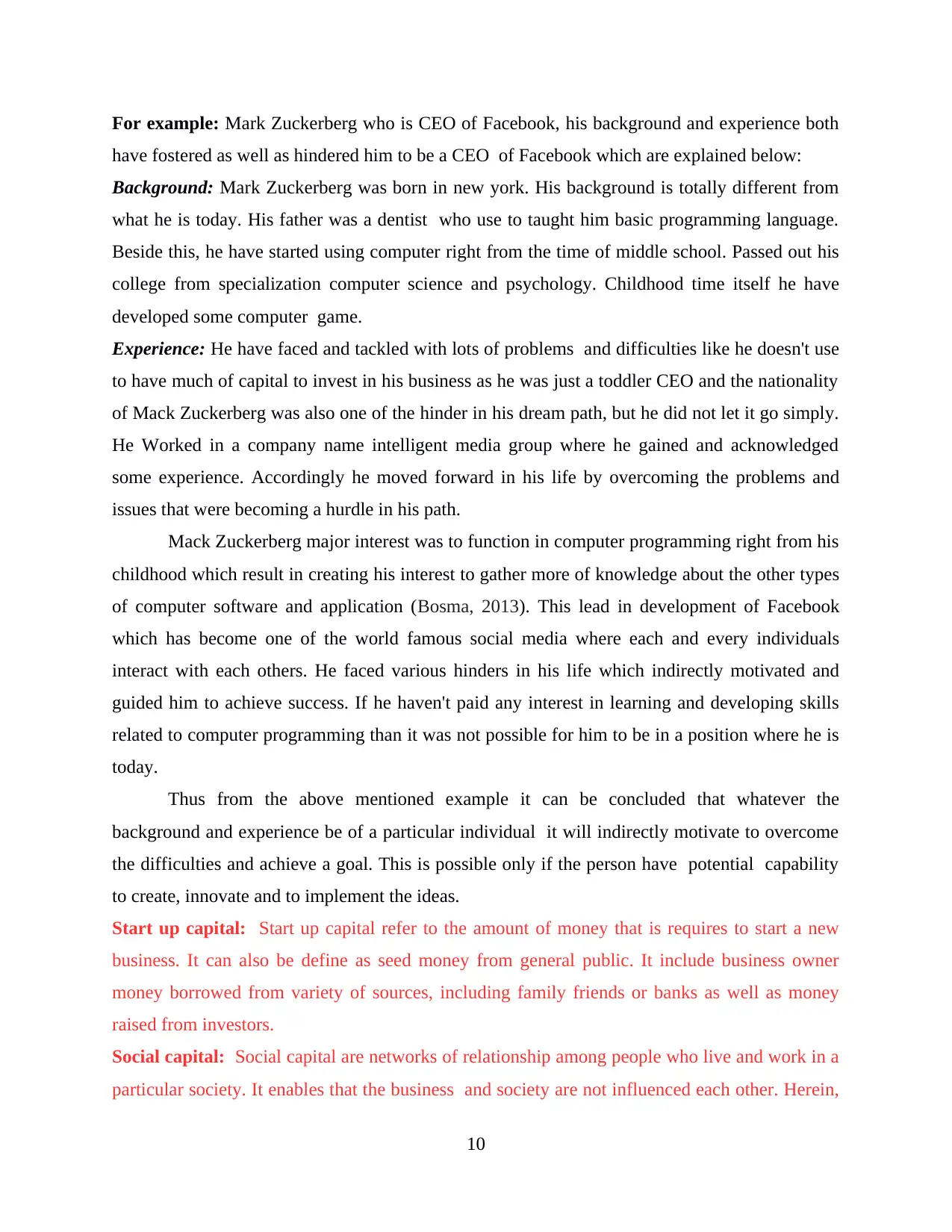
For example: Mark Zuckerberg who is CEO of Facebook, his background and experience both
have fostered as well as hindered him to be a CEO of Facebook which are explained below:
Background: Mark Zuckerberg was born in new york. His background is totally different from
what he is today. His father was a dentist who use to taught him basic programming language.
Beside this, he have started using computer right from the time of middle school. Passed out his
college from specialization computer science and psychology. Childhood time itself he have
developed some computer game.
Experience: He have faced and tackled with lots of problems and difficulties like he doesn't use
to have much of capital to invest in his business as he was just a toddler CEO and the nationality
of Mack Zuckerberg was also one of the hinder in his dream path, but he did not let it go simply.
He Worked in a company name intelligent media group where he gained and acknowledged
some experience. Accordingly he moved forward in his life by overcoming the problems and
issues that were becoming a hurdle in his path.
Mack Zuckerberg major interest was to function in computer programming right from his
childhood which result in creating his interest to gather more of knowledge about the other types
of computer software and application (Bosma, 2013). This lead in development of Facebook
which has become one of the world famous social media where each and every individuals
interact with each others. He faced various hinders in his life which indirectly motivated and
guided him to achieve success. If he haven't paid any interest in learning and developing skills
related to computer programming than it was not possible for him to be in a position where he is
today.
Thus from the above mentioned example it can be concluded that whatever the
background and experience be of a particular individual it will indirectly motivate to overcome
the difficulties and achieve a goal. This is possible only if the person have potential capability
to create, innovate and to implement the ideas.
Start up capital: Start up capital refer to the amount of money that is requires to start a new
business. It can also be define as seed money from general public. It include business owner
money borrowed from variety of sources, including family friends or banks as well as money
raised from investors.
Social capital: Social capital are networks of relationship among people who live and work in a
particular society. It enables that the business and society are not influenced each other. Herein,
10
have fostered as well as hindered him to be a CEO of Facebook which are explained below:
Background: Mark Zuckerberg was born in new york. His background is totally different from
what he is today. His father was a dentist who use to taught him basic programming language.
Beside this, he have started using computer right from the time of middle school. Passed out his
college from specialization computer science and psychology. Childhood time itself he have
developed some computer game.
Experience: He have faced and tackled with lots of problems and difficulties like he doesn't use
to have much of capital to invest in his business as he was just a toddler CEO and the nationality
of Mack Zuckerberg was also one of the hinder in his dream path, but he did not let it go simply.
He Worked in a company name intelligent media group where he gained and acknowledged
some experience. Accordingly he moved forward in his life by overcoming the problems and
issues that were becoming a hurdle in his path.
Mack Zuckerberg major interest was to function in computer programming right from his
childhood which result in creating his interest to gather more of knowledge about the other types
of computer software and application (Bosma, 2013). This lead in development of Facebook
which has become one of the world famous social media where each and every individuals
interact with each others. He faced various hinders in his life which indirectly motivated and
guided him to achieve success. If he haven't paid any interest in learning and developing skills
related to computer programming than it was not possible for him to be in a position where he is
today.
Thus from the above mentioned example it can be concluded that whatever the
background and experience be of a particular individual it will indirectly motivate to overcome
the difficulties and achieve a goal. This is possible only if the person have potential capability
to create, innovate and to implement the ideas.
Start up capital: Start up capital refer to the amount of money that is requires to start a new
business. It can also be define as seed money from general public. It include business owner
money borrowed from variety of sources, including family friends or banks as well as money
raised from investors.
Social capital: Social capital are networks of relationship among people who live and work in a
particular society. It enables that the business and society are not influenced each other. Herein,
10
Paraphrase This Document
Need a fresh take? Get an instant paraphrase of this document with our AI Paraphraser
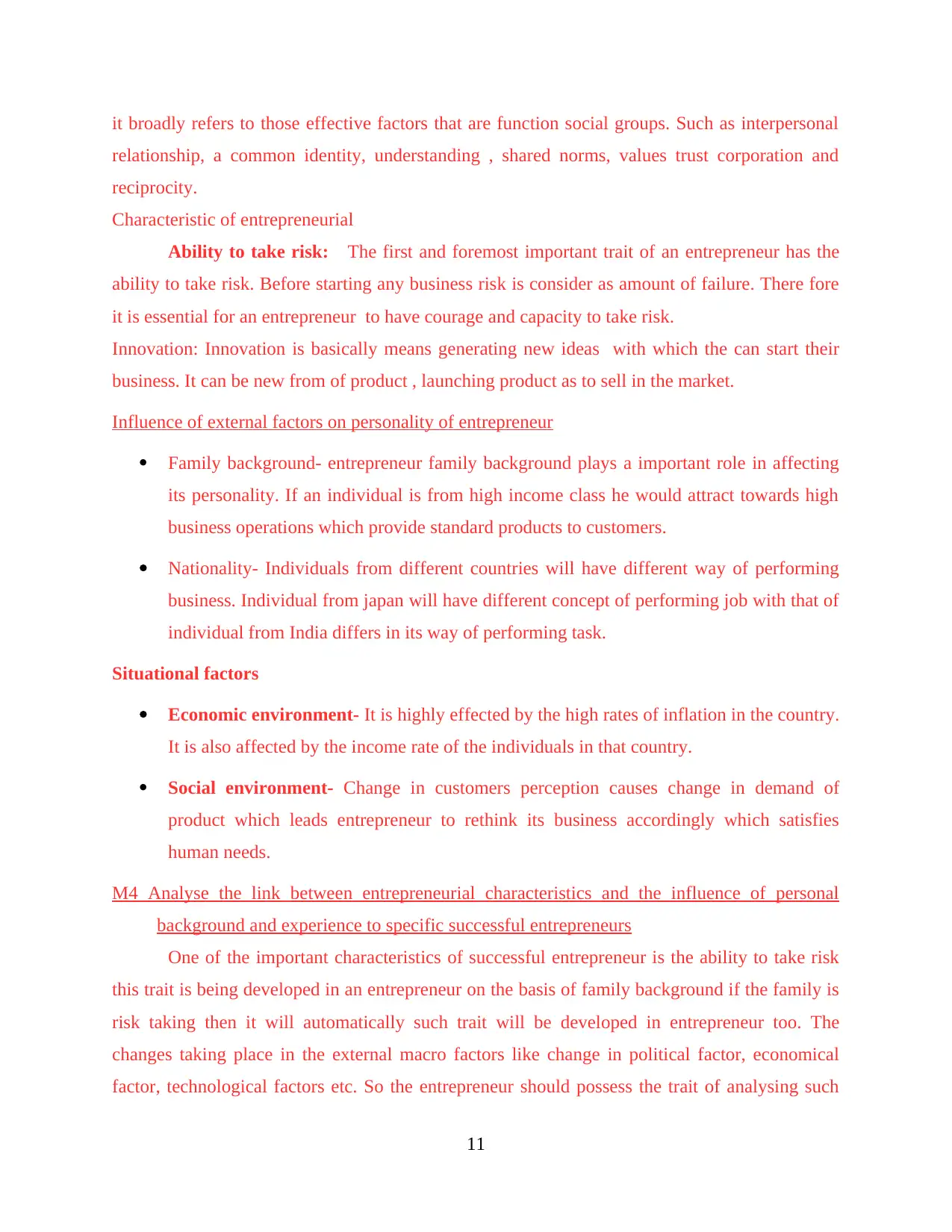
it broadly refers to those effective factors that are function social groups. Such as interpersonal
relationship, a common identity, understanding , shared norms, values trust corporation and
reciprocity.
Characteristic of entrepreneurial
Ability to take risk: The first and foremost important trait of an entrepreneur has the
ability to take risk. Before starting any business risk is consider as amount of failure. There fore
it is essential for an entrepreneur to have courage and capacity to take risk.
Innovation: Innovation is basically means generating new ideas with which the can start their
business. It can be new from of product , launching product as to sell in the market.
Influence of external factors on personality of entrepreneur
Family background- entrepreneur family background plays a important role in affecting
its personality. If an individual is from high income class he would attract towards high
business operations which provide standard products to customers.
Nationality- Individuals from different countries will have different way of performing
business. Individual from japan will have different concept of performing job with that of
individual from India differs in its way of performing task.
Situational factors
Economic environment- It is highly effected by the high rates of inflation in the country.
It is also affected by the income rate of the individuals in that country.
Social environment- Change in customers perception causes change in demand of
product which leads entrepreneur to rethink its business accordingly which satisfies
human needs.
M4 Analyse the link between entrepreneurial characteristics and the influence of personal
background and experience to specific successful entrepreneurs
One of the important characteristics of successful entrepreneur is the ability to take risk
this trait is being developed in an entrepreneur on the basis of family background if the family is
risk taking then it will automatically such trait will be developed in entrepreneur too. The
changes taking place in the external macro factors like change in political factor, economical
factor, technological factors etc. So the entrepreneur should possess the trait of analysing such
11
relationship, a common identity, understanding , shared norms, values trust corporation and
reciprocity.
Characteristic of entrepreneurial
Ability to take risk: The first and foremost important trait of an entrepreneur has the
ability to take risk. Before starting any business risk is consider as amount of failure. There fore
it is essential for an entrepreneur to have courage and capacity to take risk.
Innovation: Innovation is basically means generating new ideas with which the can start their
business. It can be new from of product , launching product as to sell in the market.
Influence of external factors on personality of entrepreneur
Family background- entrepreneur family background plays a important role in affecting
its personality. If an individual is from high income class he would attract towards high
business operations which provide standard products to customers.
Nationality- Individuals from different countries will have different way of performing
business. Individual from japan will have different concept of performing job with that of
individual from India differs in its way of performing task.
Situational factors
Economic environment- It is highly effected by the high rates of inflation in the country.
It is also affected by the income rate of the individuals in that country.
Social environment- Change in customers perception causes change in demand of
product which leads entrepreneur to rethink its business accordingly which satisfies
human needs.
M4 Analyse the link between entrepreneurial characteristics and the influence of personal
background and experience to specific successful entrepreneurs
One of the important characteristics of successful entrepreneur is the ability to take risk
this trait is being developed in an entrepreneur on the basis of family background if the family is
risk taking then it will automatically such trait will be developed in entrepreneur too. The
changes taking place in the external macro factors like change in political factor, economical
factor, technological factors etc. So the entrepreneur should possess the trait of analysing such
11
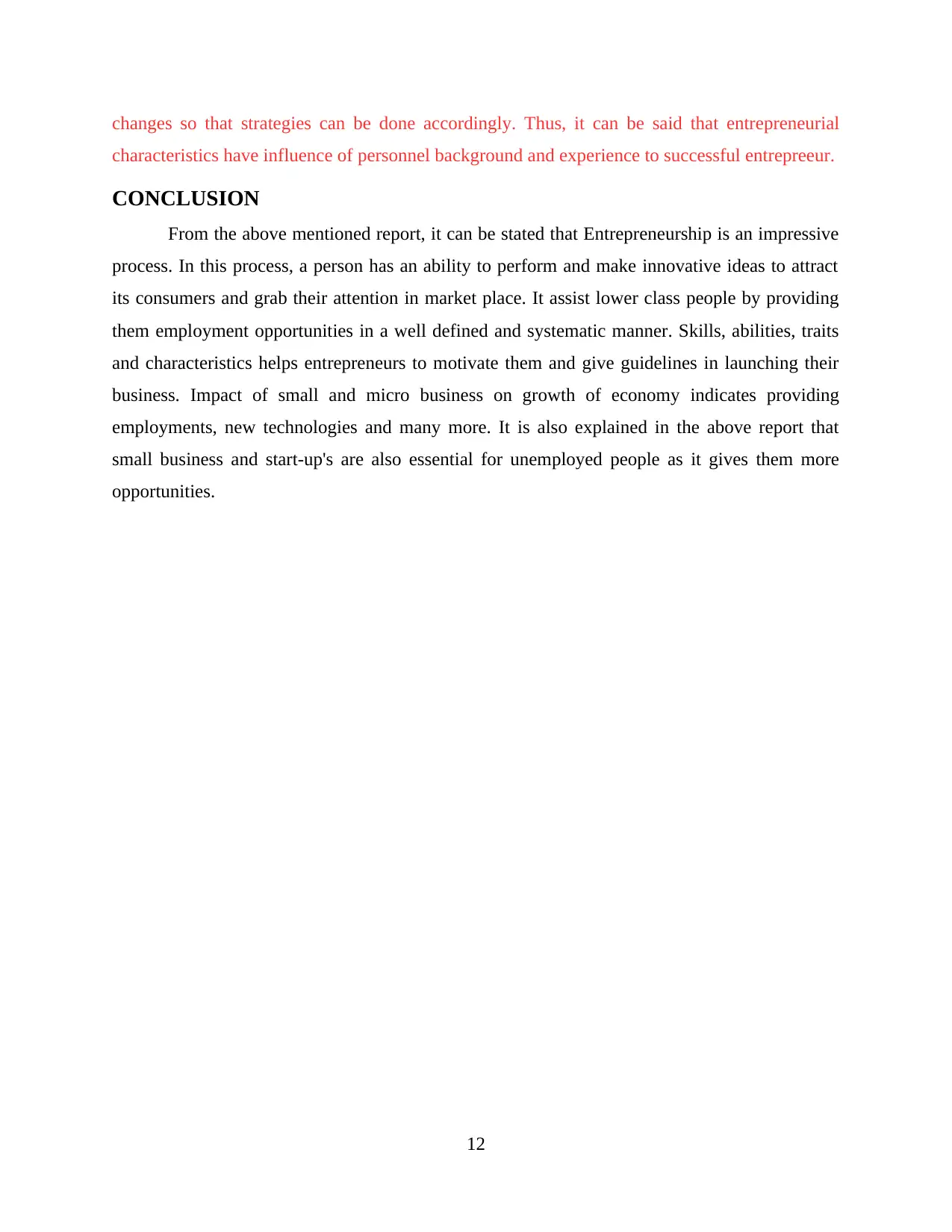
changes so that strategies can be done accordingly. Thus, it can be said that entrepreneurial
characteristics have influence of personnel background and experience to successful entrepreeur.
CONCLUSION
From the above mentioned report, it can be stated that Entrepreneurship is an impressive
process. In this process, a person has an ability to perform and make innovative ideas to attract
its consumers and grab their attention in market place. It assist lower class people by providing
them employment opportunities in a well defined and systematic manner. Skills, abilities, traits
and characteristics helps entrepreneurs to motivate them and give guidelines in launching their
business. Impact of small and micro business on growth of economy indicates providing
employments, new technologies and many more. It is also explained in the above report that
small business and start-up's are also essential for unemployed people as it gives them more
opportunities.
12
characteristics have influence of personnel background and experience to successful entrepreeur.
CONCLUSION
From the above mentioned report, it can be stated that Entrepreneurship is an impressive
process. In this process, a person has an ability to perform and make innovative ideas to attract
its consumers and grab their attention in market place. It assist lower class people by providing
them employment opportunities in a well defined and systematic manner. Skills, abilities, traits
and characteristics helps entrepreneurs to motivate them and give guidelines in launching their
business. Impact of small and micro business on growth of economy indicates providing
employments, new technologies and many more. It is also explained in the above report that
small business and start-up's are also essential for unemployed people as it gives them more
opportunities.
12
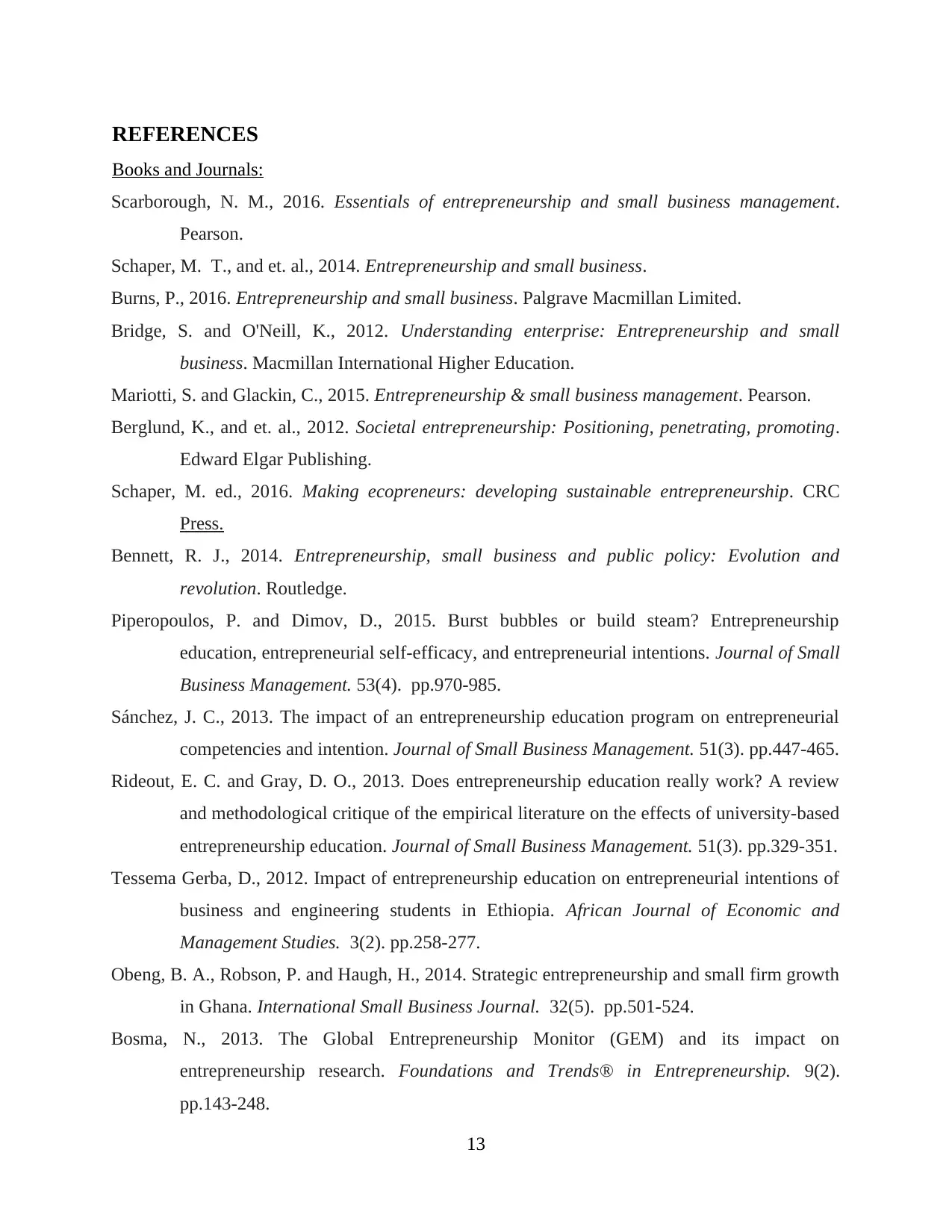
REFERENCES
Books and Journals:
Scarborough, N. M., 2016. Essentials of entrepreneurship and small business management.
Pearson.
Schaper, M. T., and et. al., 2014. Entrepreneurship and small business.
Burns, P., 2016. Entrepreneurship and small business. Palgrave Macmillan Limited.
Bridge, S. and O'Neill, K., 2012. Understanding enterprise: Entrepreneurship and small
business. Macmillan International Higher Education.
Mariotti, S. and Glackin, C., 2015. Entrepreneurship & small business management. Pearson.
Berglund, K., and et. al., 2012. Societal entrepreneurship: Positioning, penetrating, promoting.
Edward Elgar Publishing.
Schaper, M. ed., 2016. Making ecopreneurs: developing sustainable entrepreneurship. CRC
Press.
Bennett, R. J., 2014. Entrepreneurship, small business and public policy: Evolution and
revolution. Routledge.
Piperopoulos, P. and Dimov, D., 2015. Burst bubbles or build steam? Entrepreneurship
education, entrepreneurial self‐efficacy, and entrepreneurial intentions. Journal of Small
Business Management. 53(4). pp.970-985.
Sánchez, J. C., 2013. The impact of an entrepreneurship education program on entrepreneurial
competencies and intention. Journal of Small Business Management. 51(3). pp.447-465.
Rideout, E. C. and Gray, D. O., 2013. Does entrepreneurship education really work? A review
and methodological critique of the empirical literature on the effects of university‐based
entrepreneurship education. Journal of Small Business Management. 51(3). pp.329-351.
Tessema Gerba, D., 2012. Impact of entrepreneurship education on entrepreneurial intentions of
business and engineering students in Ethiopia. African Journal of Economic and
Management Studies. 3(2). pp.258-277.
Obeng, B. A., Robson, P. and Haugh, H., 2014. Strategic entrepreneurship and small firm growth
in Ghana. International Small Business Journal. 32(5). pp.501-524.
Bosma, N., 2013. The Global Entrepreneurship Monitor (GEM) and its impact on
entrepreneurship research. Foundations and Trends® in Entrepreneurship. 9(2).
pp.143-248.
13
Books and Journals:
Scarborough, N. M., 2016. Essentials of entrepreneurship and small business management.
Pearson.
Schaper, M. T., and et. al., 2014. Entrepreneurship and small business.
Burns, P., 2016. Entrepreneurship and small business. Palgrave Macmillan Limited.
Bridge, S. and O'Neill, K., 2012. Understanding enterprise: Entrepreneurship and small
business. Macmillan International Higher Education.
Mariotti, S. and Glackin, C., 2015. Entrepreneurship & small business management. Pearson.
Berglund, K., and et. al., 2012. Societal entrepreneurship: Positioning, penetrating, promoting.
Edward Elgar Publishing.
Schaper, M. ed., 2016. Making ecopreneurs: developing sustainable entrepreneurship. CRC
Press.
Bennett, R. J., 2014. Entrepreneurship, small business and public policy: Evolution and
revolution. Routledge.
Piperopoulos, P. and Dimov, D., 2015. Burst bubbles or build steam? Entrepreneurship
education, entrepreneurial self‐efficacy, and entrepreneurial intentions. Journal of Small
Business Management. 53(4). pp.970-985.
Sánchez, J. C., 2013. The impact of an entrepreneurship education program on entrepreneurial
competencies and intention. Journal of Small Business Management. 51(3). pp.447-465.
Rideout, E. C. and Gray, D. O., 2013. Does entrepreneurship education really work? A review
and methodological critique of the empirical literature on the effects of university‐based
entrepreneurship education. Journal of Small Business Management. 51(3). pp.329-351.
Tessema Gerba, D., 2012. Impact of entrepreneurship education on entrepreneurial intentions of
business and engineering students in Ethiopia. African Journal of Economic and
Management Studies. 3(2). pp.258-277.
Obeng, B. A., Robson, P. and Haugh, H., 2014. Strategic entrepreneurship and small firm growth
in Ghana. International Small Business Journal. 32(5). pp.501-524.
Bosma, N., 2013. The Global Entrepreneurship Monitor (GEM) and its impact on
entrepreneurship research. Foundations and Trends® in Entrepreneurship. 9(2).
pp.143-248.
13
Secure Best Marks with AI Grader
Need help grading? Try our AI Grader for instant feedback on your assignments.
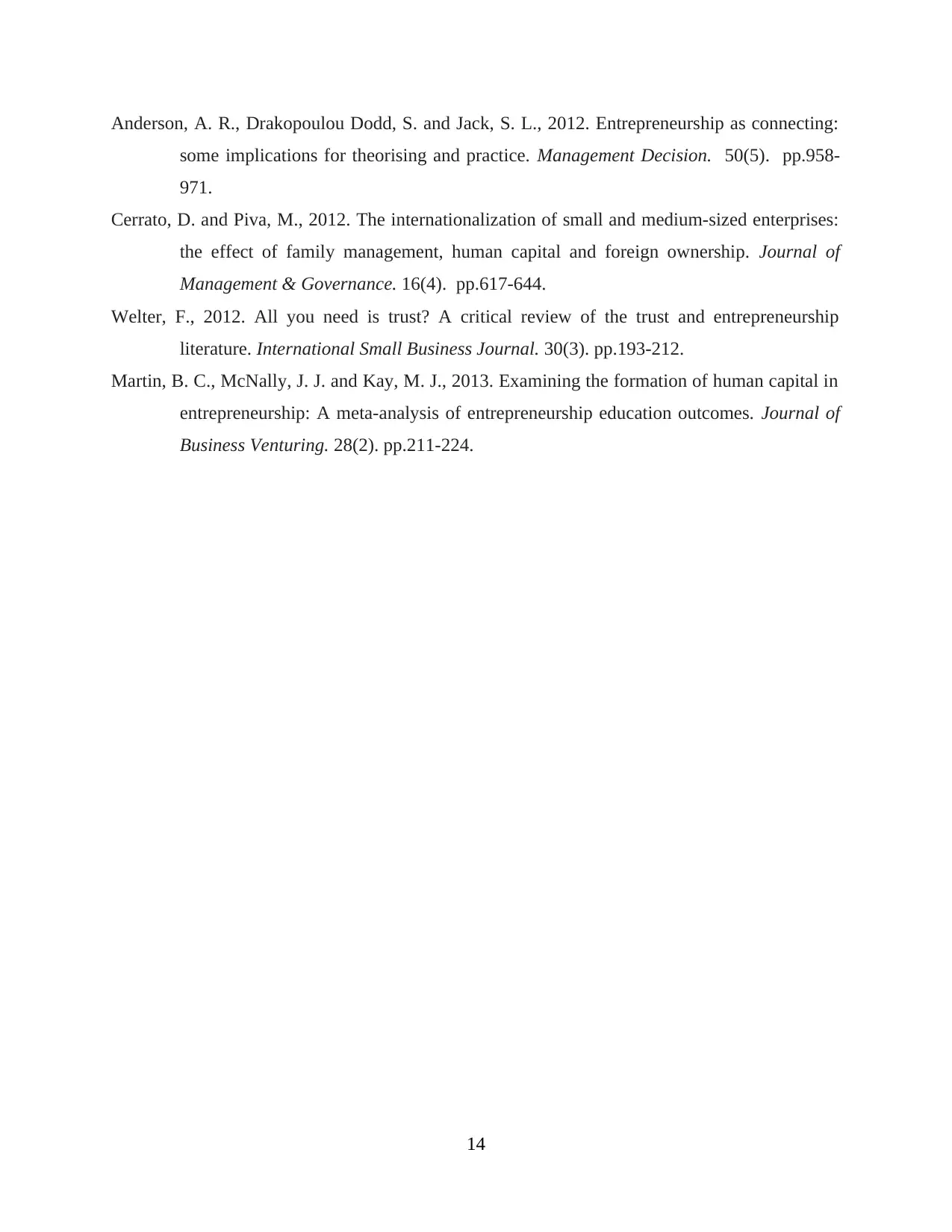
Anderson, A. R., Drakopoulou Dodd, S. and Jack, S. L., 2012. Entrepreneurship as connecting:
some implications for theorising and practice. Management Decision. 50(5). pp.958-
971.
Cerrato, D. and Piva, M., 2012. The internationalization of small and medium-sized enterprises:
the effect of family management, human capital and foreign ownership. Journal of
Management & Governance. 16(4). pp.617-644.
Welter, F., 2012. All you need is trust? A critical review of the trust and entrepreneurship
literature. International Small Business Journal. 30(3). pp.193-212.
Martin, B. C., McNally, J. J. and Kay, M. J., 2013. Examining the formation of human capital in
entrepreneurship: A meta-analysis of entrepreneurship education outcomes. Journal of
Business Venturing. 28(2). pp.211-224.
14
some implications for theorising and practice. Management Decision. 50(5). pp.958-
971.
Cerrato, D. and Piva, M., 2012. The internationalization of small and medium-sized enterprises:
the effect of family management, human capital and foreign ownership. Journal of
Management & Governance. 16(4). pp.617-644.
Welter, F., 2012. All you need is trust? A critical review of the trust and entrepreneurship
literature. International Small Business Journal. 30(3). pp.193-212.
Martin, B. C., McNally, J. J. and Kay, M. J., 2013. Examining the formation of human capital in
entrepreneurship: A meta-analysis of entrepreneurship education outcomes. Journal of
Business Venturing. 28(2). pp.211-224.
14
1 out of 23
Related Documents
Your All-in-One AI-Powered Toolkit for Academic Success.
+13062052269
info@desklib.com
Available 24*7 on WhatsApp / Email
![[object Object]](/_next/static/media/star-bottom.7253800d.svg)
Unlock your academic potential
© 2024 | Zucol Services PVT LTD | All rights reserved.





